#my analysis of my writing
Explore tagged Tumblr posts
Text
#actual write up on the “twitter leak”#heavily based on my analysis but also various other statements and background info i and others gave to daily dot
4K notes
·
View notes
Text
i’ve seen a lot of posts talking about nimona’s queer messages which is great! but ive not seen as many posts talking analyzing how both ballister and ambrosius were changed to be asian, which is a shame because i genuinely think its one of the most important parts of the film! a huge part of it is a deconstruction of the model minority myth and respectability politics, both of which are big issues in the asian american community. both of them represent each side of the spectrum, with ambrosius expected to be superhuman with very little support and ballister being seen as less than human, no matter how hard he tries- a monster.
ambrosius (who is now east asian, like his voice actor eugene lee yang, who is korean with chinese and japanese ancestry), despite being in a seemingly powerful position as head of the knights and a descendant of gloreth, he isn’t really given the kind of support that this position needs- he’s constantly undermined and belittled by todd, the face of the other knights, and when asked about his emotional state by the director, represses his emotions rather than talk to her about his true feelings. this is very similar to how asian american students in schools aren’t given the support they need academically by teachers and administration, as the model minority myth leads to them being perceived as more intelligent and competent than their fellow students and therefore not needing support. he’s also held to a higher standard than any of the other knights, being immediately placed into a position of power despite just being knighted, again a reflection of the model minority myth, since asian americans are held to higher standards unfairly. despite being technically better off than ballister, he has no support, no friends, no way to seek help for his problems, and, just like ballister, is immediately thrown away the moment the director thinks he’s served his use.
ballister is now pakistani, like his voice actor riz ahmed (no, not like pedro pascal. where did this come from lol), and i’d go as far as to say that he is also, if not explicitly muslim, heavily muslim coded as well. he’s framed as a terrorist by the white, christian institution, and from then on, it doesn’t matter how good he tries to be- everyone else sees him as a monster. he’s also from a lower socioeconomic class than ambrosius and the rest of the knights- while this is initially used to frame him as a success story, after he’s framed, it’s used to cast suspicion on him. almost immediately he’s othered, with posters casting him as a foreign invader sent to destabilize the city, much in the same way that muslim immigrants are seen in real life. even when he tries to be peaceful and good, it’s always twisted so that he’s the monster of the story. while ambrosius is held to too high of a standard, ballister will never be enough for the institution to accept.
which is why both of their arcs culminate in them breaking out of the system, learning to accept what they’d been taught was monstrous, and leaving behind respectability. it’s a genuinely great commentary, and i can definitely see why riz ahmed and eugene lee yang were chosen for this, as they’ve both done activist work for their communities.
#nimona#chatters#another analysis post i made at two am and then put in my drafts and forgot about LMAO#anyways i forgot to actually write a conclusion but shut up this isn't school i don't have to conclude SHIT#ballister boldheart#ambrosius goldenloin
11K notes
·
View notes
Text
one thing that i find interesting is that even though we never get to interact with Marika directly, only knowing her via obscure cutscenes and other characters' dialogue... she actually displays a wide range of emotions as much as any other NPCs.
her statues depict her as having a warm, gentle smile:
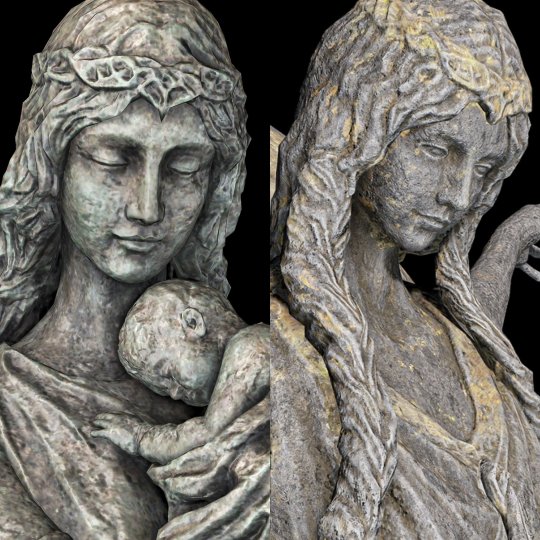
the Mimic veil description points to her playful, mischievous side:
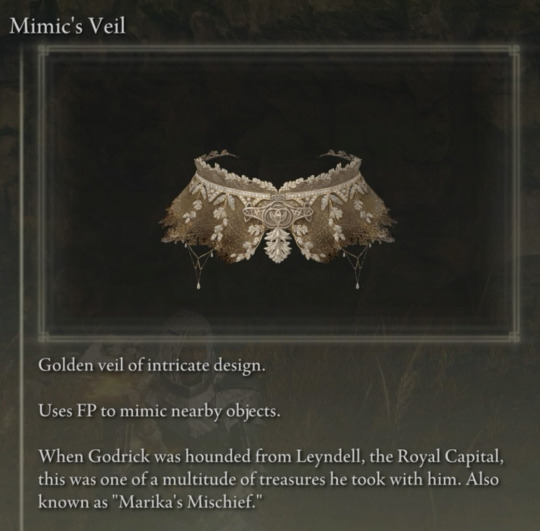
(it's a popular theory in the JP/Asian side of the fandom that it's sth from her childhood - hence the "Marika's Mischief", not "Queen Marika's", and she used it to escape the grisly fate befalling her family.
additionally, its equivalence in Dark Souls is also something described as "the mischief of a young girl who sought relief from the solitude of the woods at dusk", aka Princess Dusk who hails from "Oolacile, land of ancient golden sorceries", but i digress)
her portrait, the story trailer's "Queen Marika was driven to the brink" and Gideon's dialogue after the player defeated Malenia pointed out her sorrow:

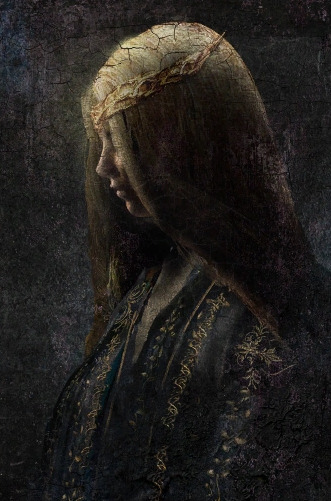
(back when i first played the base game, this is the portrait that drove my eyes most in Roundtable Hold. i kept gazing at her - the Queen with permanently lowered eyes, and thought "there is a girl in there")
The bat lady's song, Messmer's entire Crusade, all those conflicts to establish the Erdtree, shows her anger, and the cruelty she's capable of:

Then there's Shaman's village, the clinic underneath Shadow Keep, the golden braid, the Minor Erdtree, the sealing of Death - that points to grief, trauma, survivor guilt, kindness, and the ruinous drive for revenge that results in the above path down hell:

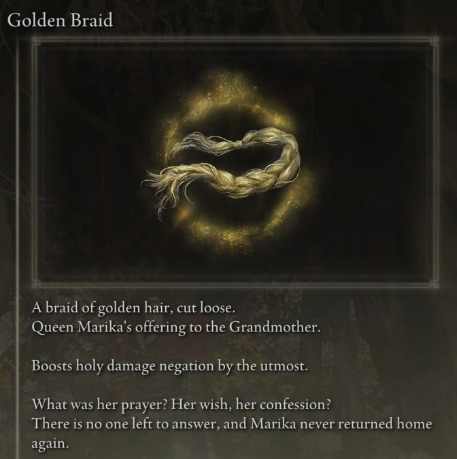
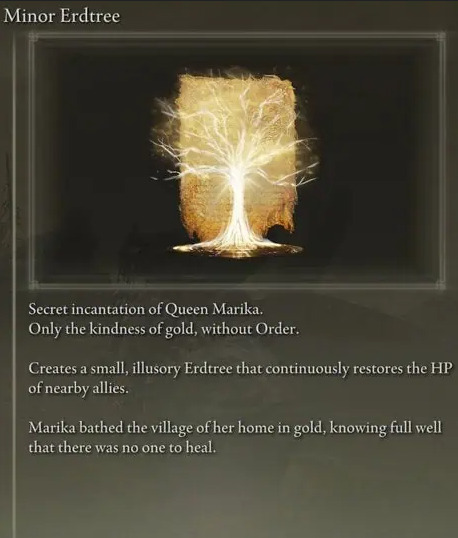
(there's also a theory for the Crusade's headless statue being a reminder for the Hornsent of what they put Marika's mother through, but it's not concrete canon so here is the link if you want to check it out)
The fact that all of Erdtree's incantations are heal and protection spells (with only one exception of Wrath of Gold spell which was found after the Elden Ring was shattered), the Capitol's Perfumers originally being blessed healers, and that all Erdtree blessings come in the shape of tears give the picture of Marika's gentle wish at the beginning: to heal everything and everyone.
(and to me personally, there's a kind of vulnerability and honesty in showing your tears to the world and let it be your power to heal at the same time.)
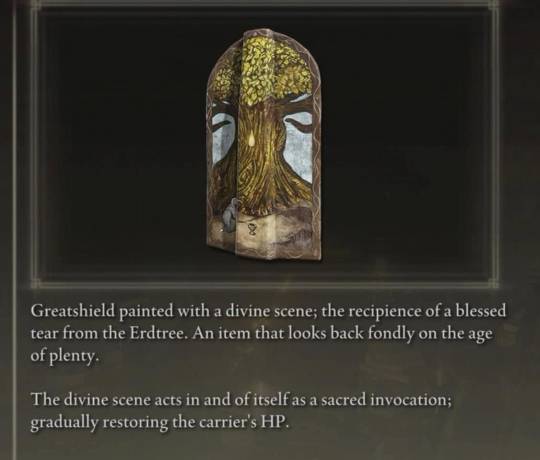

the eye she blessed Messmer with (i do think the Eng translation at some part lost the sentiment of the JP text - that the eye is always referred to as a blessing)
the blessing flask that - unlike its Dark Souls equivalent (which ranges from 6-13 flasks), only have 4 available to us player, heal all ailments and status effect, and specified as sth made for Messmer.
the Marika's soreseal in the Haligtree + the waterfall near Godwyn's final resting place
the Regal Omen Bairn (that was fashioned after the Jizo statue - sth made by grieving parents wishing for protection for their deceased child in the afterlife)
the blessing, gifts, equipment that Messmer and Godwyn's personal knights all get
the fact that Marika's bedchamber and the Impaler's Catacomb (which is the only catacomb in the base game to have the spike trap mechanic used in catacombs in the DLC) remain the proof of Messmer's existence in the base game
how Godwyn's ending is the only ending where the mending rune is placed on the position of Marika's womb (the lower arc or the Elden Ring - also referred to as the basin in which its blessings pool)
that's a whole barrage of motherhood. the love, the fear, the postpartum depression, the guilt and anxiety, (the occasional scheming for revenge with her son). and despite how flawed and tragic that love ends up being for all of them, it is there.
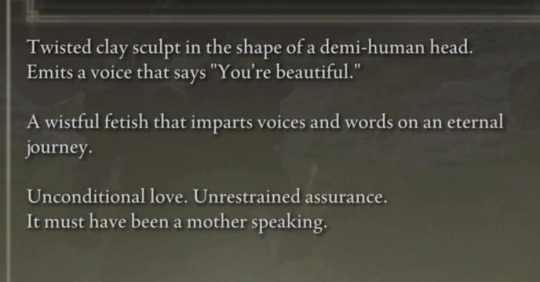
(there's a whole subplot about how Messmer is the only demigod to be called ugly in-game (Hornsent npc dialogue) while Boc's questline is about how his mother being the only one to always assure him he's beautiful, despite everyone else calling him ugly. and how each NPCs questline does reflect a wider theme seen in Marika and her children. but again, i digress)
every time i think of her, Marika is a constantly shifting kaleidoscope, holding everything from within (the beauty and the malign, light and dark, birth and death, she's warm and gentle, she's cruel and unjust, she's strong and kind, she's weak and resentful, she's sweet and she's bitterness made flesh)... and i could only stand there and admire it all.
#elden ring#queen marika the eternal#my uwu baby with a disorder#every time i do the ending the only thing in my head is “to you who bloomed and fell away as a fruitless flower. farewell”#she got me writing essays like the average fandom male character analysis :)#messmer the impaler#er brainrot#golden doomed mother and son#ending this year with another marika rant like god intended
844 notes
·
View notes
Text
Why Will Byers?
An analysis and theory on why Henry/Vecna targeted Will first in season 1 and his plans for Will in season 5
‼️Contains The First Shadow (TFS) spoilers so please proceed with caution.‼️
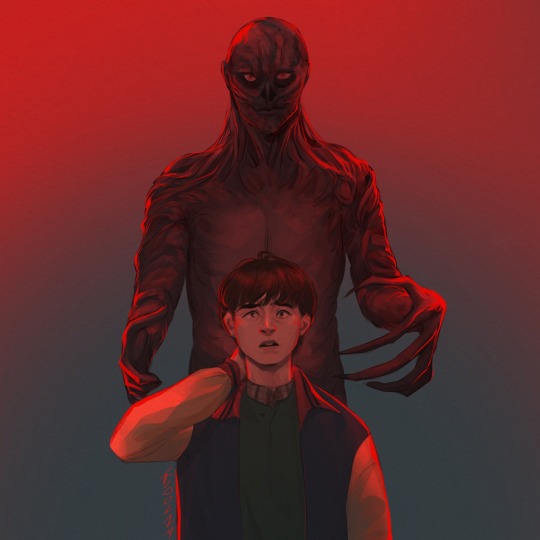
This is going to be a little long but I’ve tried to give as much context as I can without actually being able to show snippets from the stage play. This is my interpretation of everything that went down as a member of the audience and not as someone who has read up any theories about TFS before. To understand why Henry took Will first in 1983, we have to start with -
Henry and Joyce
From all the times I’ve watched TFS, the one thing that has stuck with me is the final conversation Henry has with Joyce. It’s just before his last confrontation with Patty Newby and before he joins Brenner for good. Joyce is the last person (who doesn’t know about Henry’s powers) that he canonically talks to.
Throughout the entire play Joyce, Hopper, and Bob are investigating the animals dying at the hands of Henry and come to the conclusion that Victor Creel has been the one doing the killing. They get so close to solving the case. In her last conversation with Henry, Joyce tries to comfort him by saying that Victor will pay for his crimes - which makes Henry laugh because she’s so close yet so far from the truth. He gets a little frustrated and says something along the lines of “You don’t get it. But someday you will.” (edit 28/9: the exact dialogue is [Henry: you’re too nice. that is how they’ll get you. you have to learn to do anything you can to protect the ones you love] [Joyce: I don’t understand.] [Henry: You will.]) The next time we see Henry make a reappearance in Joyce’s life is during -
The Vanishing of Will Byers
Will is taken into the Upside Down (UD) by Henry. It’s not even a question anymore. All of the context clues from 1x1 lead us to believe that Will’s kidnapping was not by a demogorgon. Will - a 12 year old - miraculously survives a week in the upside down with no food or water. Will is even around the demogorgon a few times in the Upside Down. (Joyce communicating with Will through the lights and then the demogorgon coming after her immediately).
Barb dies the night she is taken but Will stays alive and also somehow manages to talk to Joyce through the wall. Joyce is led exactly to where Will was held at the end of s1 and he makes it out alive. It’s almost as if Henry knew all along that Joyce was the most capable of never giving up on finding her son. Like Henry took Will Byers because he was Joyce’s son. And like he was giving her just enough to know that Will was alive. Even when Joyce and Hopper find him at the end in a state of near death, he’s not injured by a creature. He was being prepared for the next stage of Vecna’s plan -
The Possession of Will Byers
The origins of Henry’s powers happen as such - As a kid, he is transported into the UD (originally coined Dimension X by the government) for a few hours because he touched something he wasn’t meant to touch. During his time in there, he came in contact with the Mind Flayer (MF). According to TFS this is the point in his life when he started getting “corrupted”. Brenner’s dad - who was one of the first people to enter dimension X - had mutated blood after but no powers. Henry was the first person to come in contact with the MF and it’s highly likely he got his powers because of this (This would also track considering how most of the party has been in the UD now but show no signs of having powers). The MF controls Henry for the rest of TFS and Henry grows more power hungry the more he kills.
In S2, Henry presumably sends the MF after Will - who has now had a year to heal from the events of 1983. Will is the only other person in all of ST to have had direct contact with the MF and survived it. Henry didn’t hesitate to kill Billy in S3, but he always gives everyone just enough to keep Will safe. Will himself tells Owens in S2 that the MF wants to kill everyone except him. Will once again survives the entire ordeal and is given a “break” for the next 2 seasons. Except I don’t believe he’s been just given a break. I think Will is -
Henry’s Sleeper Agent.
Ready to awaken in s5. I undoubtedly think that Will is going to have powers. And I don’t think they’re going to be the same as Henry and El. El and the other lab kids get their powers directly from Henry. Will’s powers will be directly from the MF like Henry. I believe this has been Henry’s plan all along and it’s further affirmed by what he tells Will in the recent VR game. That Will will be the key to Henry being able to infiltrate his friends’ minds. Jamie Campbell-Bower also mentioned during the S4 press that to get in character, he set up a display with all of Henry’s victims and targets’ faces on his wall(?), and Will was in the center.
Henry is going to use his connection with Will sneakily and midway through S5 he’s going to awaken Will’s powers (maybe in ep4 - which is said to be titled ‘Sorcerer’ and has young Will in it). Henry is going to try and manipulate his way into making an ally out of Will, and it’s not going to work because -
Will is the Perfect Character Foil.
Will is everything Henry could have been if he had a better support system. He is the perfect character foil. Unlike Henry, Will has a mother who loves him unconditionally and more importantly, believes him. Unlike Henry, the person who Will loves the most (the Patty to Will’s Henry: Mike) is going to love him back and stay by his side all season. No one is going to force them to be apart the way Henry was told to stay away from Patty. Will is not going to be easily swayed even though Henry has spent years crafting him into the perfect soldier. Sure, Henry has seen him heartbroken and sad, but that comes nowhere near to the amount of love and support Will is going to get from his people next season. And they’re going to quite literally defeat Vecna with the power of love and friendship. After that, Will Byers is getting the happy ending that Henry could have gotten.
#stranger things#the first shadow#will byers#henry creel#vecna#vecna/henry/001#hinting at parallels between#hentty#byler#I could write a whole essay about how Mike and Will are set up to mirror Patty and Henry.#but that’s for another time#joyce byers#stranger things meta#stranger things analysis#stranger things theory#my art#the first shadow spoilers
1K notes
·
View notes
Text
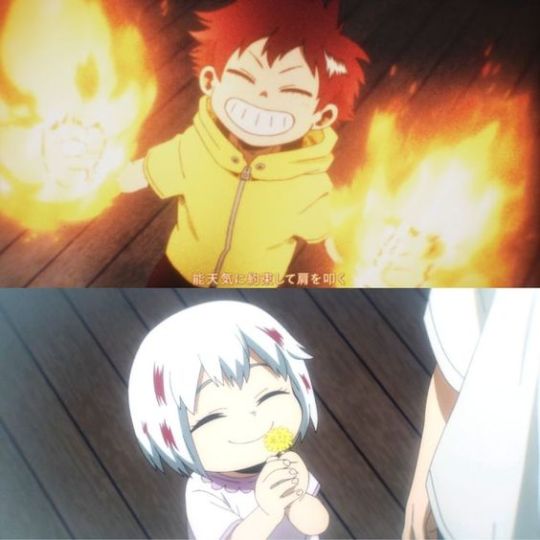
Based on the way Touya and Fuyumi behaved in their very early years, I've always gotten the impression the Todoroki family started out with something of a healthy dynamic.
The reason they were born was pretty twisted and Endeavor's ambitions may have made the foundation rotten, but I think they were 'fine' until the genetic disparity with Touya's Quirk was detected. What's sad about that is if Touya didn't have that issue, he and Fuyumi would probably have been the only two siblings. Endeavor wanted Touya for a successor. Rei wanted Fuyumi so that Touya would have a sibling and they could support each other.
Natsuo and Shouto were born because Endeavor's ambitions meant more to him than his family.
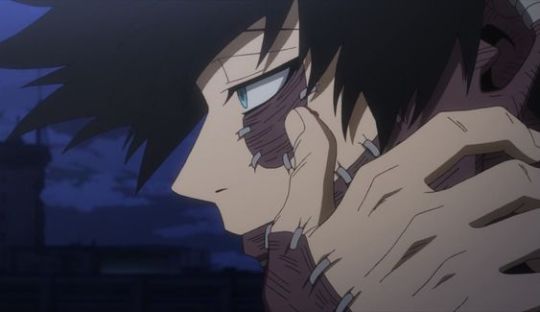
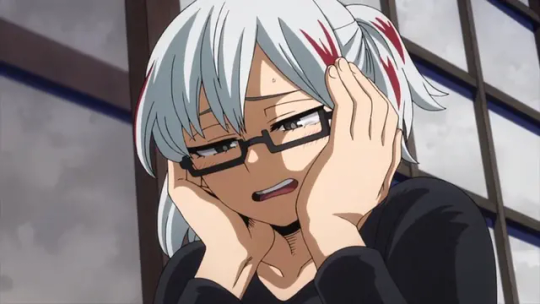
And tragically, Touya and Fuyumi are the only two kids in that family who can remember this happy life. It's why Fuyumi was so desperate to get it back, and in his own warped way, Touya also tried to reclaim it.
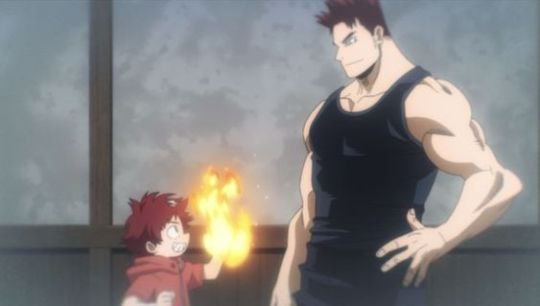
Here's the thing that gets me, though:
It is very common and normal for a toddler to prefer one parent over the other. Usually, it's the parent they're the most family with: The one that stays home with and takes care of them.
Remember, to a toddler, everything is new and potentially scary, and that can often include a parent that is not always present: The parent that's working.
In the Todoroki house, Endeavor had his career as a hero, so we have the indication that Rei was the parent who stayed home. In that situation, the probability of Rei being the 'familiar parent' was more likely, so for Touya to prefer his father over his mother shows just how close he was to Endeavor. That probably happened because 1.) we can see Endeavor started training him at a very young age, and 2.) Fuyumi was the new baby and probably needed more attention from their mother, so Touya may have gravitated away from Rei on his own and went to his father instead.
Touya didn't see his father's ambitions for him. He didn't see that he was a successor as opposed to a son. What he, a child, saw and understood was that his father loved him and wanted to spend time with him. After the genetic disparity was detected and that pride and affection disappeared, he didn't know how to cope.
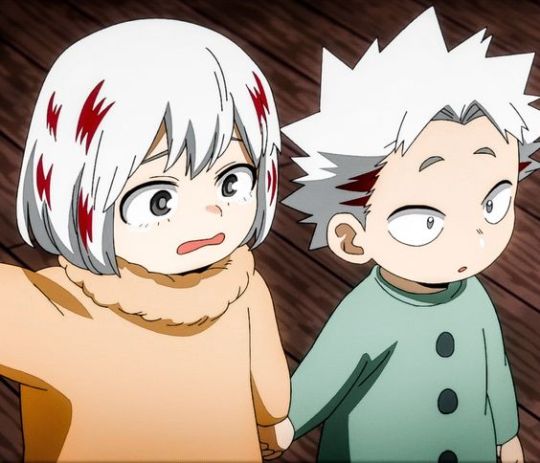
In contrast, Natsuo and Shouto never even saw the family happy. Natsuo was three-four years old when this happened. Fuyumi looks devastated that things aren't her version of normal. Natsuo just looks confused because, again, everything is new to toddlers. This was the normal he grew up with. Touya attacking Shouto might be one of his first memories, so he never stood a chance and that is why he left home the moment he had the opportunity.
It also explains his lack of understanding for Fuyumi's hope for a normal family. Fuyumi's mindset runs as, "We had that once. It's possible to have it again." Which in its own way, expecting things can just return to the way they were is a little disrespectful to her brother that died, and I think Touya's reappearance did shatter her illusion since she never brings up 'being a real family' after Dabi's Dance.
The point is, since Natsuo never saw what Fuyumi and Touya saw, he can't see what she wants to return to, so her decision to forgive their father is one he can't comprehend.
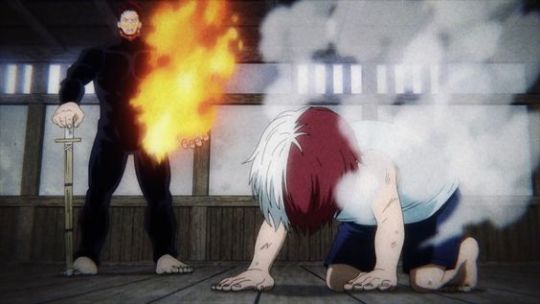
And if Natsuo can't remember the happy family, then there's no way Shouto does because this is what their home looked like by the time he was old enough to start forming concrete memories.
We're looking at two different sets of children, the older pair and the younger pair, who started out with very different childhoods.
#my hero academia#fuyumi todoroki#touya todoroki#dabi#todoroki family#natsuo todoroki#shouto todoroki#rei todoroki#endeavor#enji todoroki#boku no hero academia#bnha#mha#character analysis#this started off as short blip#wasn't expecting to write a brief analysis tonight
2K notes
·
View notes
Text
as much as I love the common "Tim worships/stalks Jason" trope in TimJay fanfiction because it's Good and making Tim a weird little freak is Fun, I think the underutilized dynamic is where Jason is the one weirdly obsessed with Tim and makes it Tim's problem.
Like, the moment Jason is confronted with the information that a third Robin exists, the first thing he does is cover his wall with pictures of Tim so he can just obsess and torture himself over it. That is the behavior of a man who is Unwell over Tim's existence and I love it.

red hood: lost days #4
And as much as a shitshow as The Titans Tower Incident™ is characterization-wise (though I think it has far more merit in depicting Jason's character than people give it credit for but I digress-) there's something very fun about the fact that even after kicking his ass, Jason respects Tim and is impressed by him.

teen titans (2003) #29
And on top of that, Jason can't seem to stop trying to ask Jason to Tim to work with him in some capacity.


robin (1993) #177



batman: battle for the cowl #2
While Battle for the Cowl is an exceptionally bad comic, especially for its characterization of Jason and the "be my Robin" bit is taken deeply out of context, I do think it's interesting how obsessed Jason is with believing that Tim is extremely competent, only held back by being "brainwashed by Bruce". (hence him leaving Tim for dead later on in the comic.) Jason seeing a darker side of Tim and wanting to bring that out of Tim, wanting to see what Tim could be if he let go of his loyalty to Bruce is so fun to me, tbh.
And in Robin #177, Jason seems genuinely upset Tim doesn't want to work with him. Jason sees such a raw potential in Tim and is obsessed with it, constantly wanting Tim to work for him and see Tim be the type of person Jason is. And despite Tim rejecting him, Jason doesn't shoot to kill Tim. I just cannot get over the fanfic potential of Jason obsessing over Tim, tracking him and seeing what he's capable of and what he could be capable of. Wanting to make Tim see things the way he does. To Tim it's corruption, to Jason it's freedom. Tim trying to 'save' Jason is fun and all, but Jason trying to corrupt Tim? That's even more fun to me. Watching that power struggle between them, Tim unable to get Jason off his heels as Jason gets more and more possessive and bold with each attempt.
And when Jason sees Tim successfully get Gotham back under control after a gang war, he's impressed. He praises Tim, even. And then Tim just. Breaks him out of prison.

robin (1993) #182
The way they're constantly trying to see something in the other that isn't there, hoping the other will come around? That is the most fucked up hate/love dynamic ever. Jason keeps coming back to Tim, keeps trying to find ways to get Tim onto his side. They're always chasing each other. And I think Jason would be the one to confess love first, the one to do anything to make Tim his. And when you consider after all of this, Tim has his Red Robin arc and is at his lowest, getting the closest he ever gets to considering murder? I think it'd be so fun to see Jason take advantage of that and worm his way back into Tim's life and finally push Tim over the edge.
#jaytim#timjay#tim drake x jason todd#jason todd x tim drake#batcest#necrotic festerings#for the record i could've continued showing examples if i delved into the new-52#but this is meant to be entirely a pre-flashpoint meta analysis of their dynamic#but in the new-52 jason explicitly says tim is the only member of the batfam he likes and they work together regularly#but new-52 also ate ass with tim's characterization so i cannot use it in good faith on this post.#my first tumblr meta on this blog and i'm feeling stressed about putting my thoughts in the open won't lie#one day i'll come back to the titans tower incident and expand on my thoughts on why it's not as bad as ppl make it out to be#dare i say. it's mostly in character for jason minus the ridiculous robin suit and some of his grandstanding#but that debate is for another day#fyi anyone can take this stuff as a prompt/inspo and run with it for fic pls go wild#someday i'll probably write my own take on it too
2K notes
·
View notes
Text
Chuuya's reaction to Dazai getting hurt during the Lovecraft fight has always been so interesting to me...
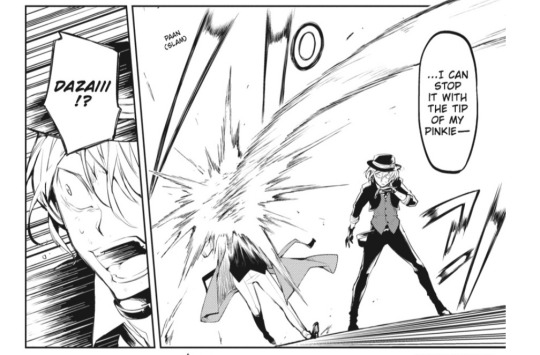
Because it's the kind of worry you'd never expect from a character as gruff as Chuuya, who had displayed nothing but hostility towards Dazai so far. Usually, characters that are labelled as "angry" or "anger issues" (which Chuuya is much more complex than that but you get my point) act more as a tsundere type of way when the one they "don't care about" gets hurt. And show their care in very, very subtle ways (ex. their eyes widen, their mouth parts and closes again, etc) before putting up their front once more.
Chuuya, however, is open, and vocal about it. His worry is clear not only to us, but to Dazai himself, the one he shouldn't be displaying the concern to (as per the cliche). Shouldn't it be some sort of secret that Chuuya does care? Isn't that what skk's dynamic has been shaping up to be until now?
I'm telling you- the way my mind blanked when Chuuya just casually.... showed concern not once, but twice, was a sight to see.
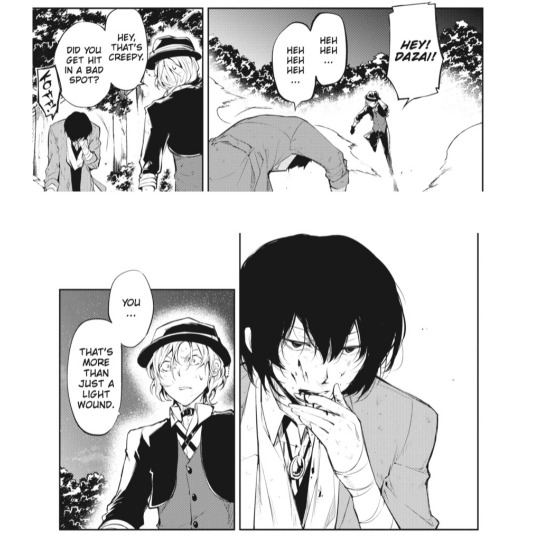
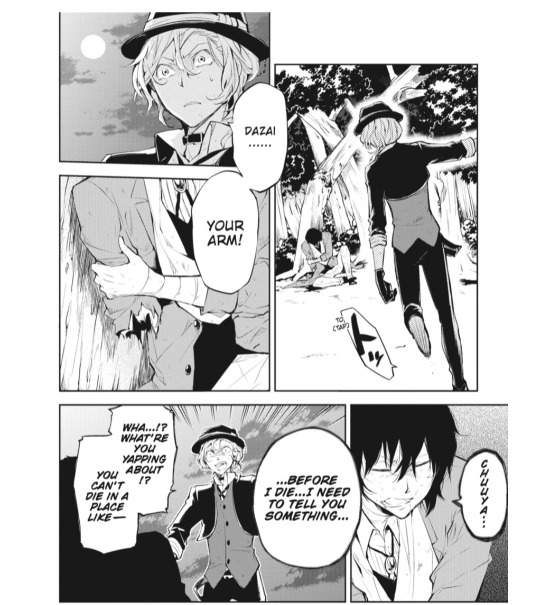
Besides, the context makes it much more confusing, because Dazai isn't some rookie, and Chuuya knows that more than anybody. He was the youngest executive in Port Mafia's history, of course he can handle a hit or two. Of course he'd seen him handle a hit or two, sometimes without batting an eye.
Heck, Chuuya himself was hurling Dazai like a ragdoll in their reunion, which was their last meeting. And you could argue that he was going easy on him, but Dazai has mostly withstood the same damage (as far as I could see), and Chuuya was as bitter as ever.


So that kind of contradicts both what we knew of Chuuya so far, and how their dynamic was shaped to be. I mean, that just makes Chuuya a hypocrite, yeah? What makes him care now, all of a sudden? What makes him care at all?
Well, to me, this backasswards reaction implies one (or more) of the following:
- Dazai rarely got physically hurt during their partnership and thus this is an unexpected thing for him to see (during a mission).
- The four years of separation made Chuuya unsure of how much Dazai can withstand physically now. Also the fact that he isn't in the mafia anymore, aka fighting enemy organizations on the weekly, would naturally make Dazai lose his touch in a way, what prompts Chuuya's reaction.
- Dazai getting taken off guard took him off guard which led to panic. Especially since the situation was (momentarily) out of their depth. Seriously wtf even was Lovecraft?
- During the dungeon scene Dazai was an enemy, while in the Lovecraft fight he was as an ally. The difference might be significant to Chuuya.
- This has always been Chuuya's reaction to Dazai getting hurt regardless of the situation.
- "Only I can hurt him like that" ahh logic
- Asagiri was still experimenting with their dynamic and thus there are some inconsistencies.
This scenario didn't play out again (after their reunion) for me to exactly determine which one is more plausible, but it is 100% canon for Chuuya to shamelessly show his concern and run to Dazai to check on him before properly dealing with their opponent, which I find to be such an appealing layer to their dynamic, and a good spin on the type of character he gets stereotyped as.
Bonus: Dazai also becomes a softy when Chuuya's hurt, especially post corruption. Dead Apple alone displays that multiple times.
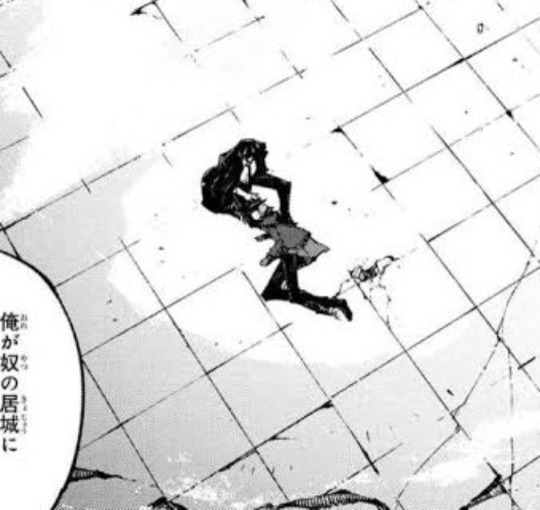
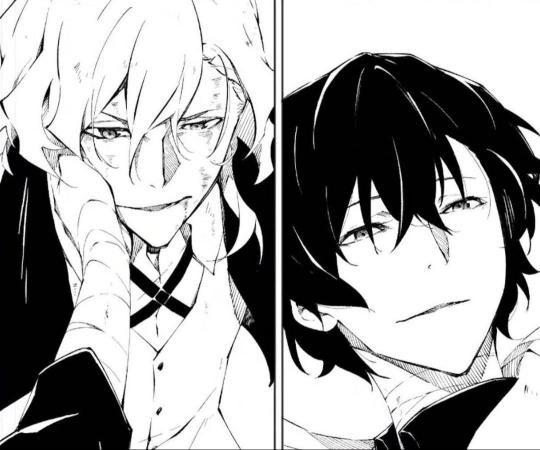
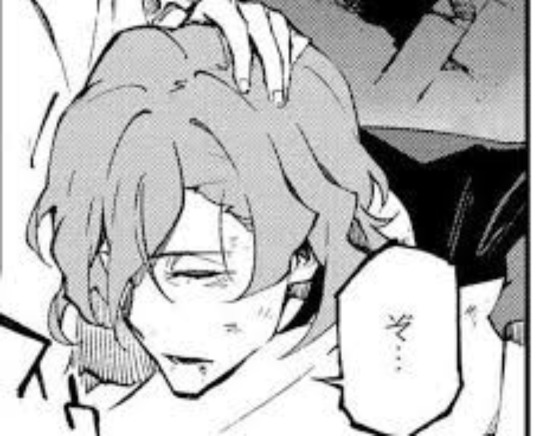
All in all, Skk are doing a terrible job at maintaining their 'hostile' and 'antagonistic' relationship post their reunion. Freaks.
#I was too lazy to scour throgh SB and 15 and find Chuuya getting worried again which might prove the last points#tho I think they're the most unlikely#I love them displaying these sort of things openly#for Chuuya it's just natural to be concerned#it's natural to say 'because I trusted you'#and while Dazai isn't as expressive with his care#he never cowers away from calling Chuuya 'partner' after 4 years#or express that how he saved him was 'beautiful'#these things come so easily for them you wonder why they're even labelled as rivals at all#you *can't* give a clear label on their relationship#friends? they hate each other. Rivals? they care about each other. Partners? they haven't been for 4 years.#each one you put on gets contradicted at one point#and that's the beauty and fun of it#thanks for coming to my TED talk#bsd#bungou stray dogs#chuuya nakahara#dazai osamu#bsd chuuya#bsd dazai#skk#soukoku#bsd analysis#bsd headcanon#bsd headcanons#skk analysis#bsd meta#J's post#J's writing ✍🏽
1K notes
·
View notes
Text
Leo's relationship with death
Leo really doesn't like to think about death.
I mean, we all saw how much impact Karai's death had on all of Mad Dogs but Leo was the only one that had to be dragged from her, yelling after her, he really, really didn't want to lose her.
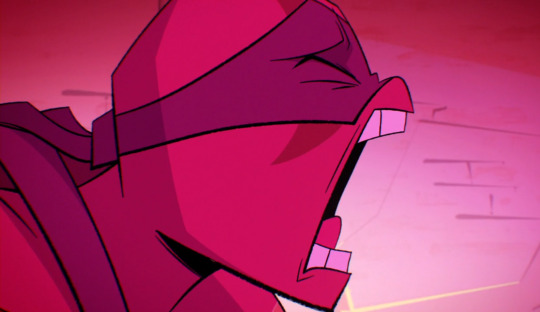
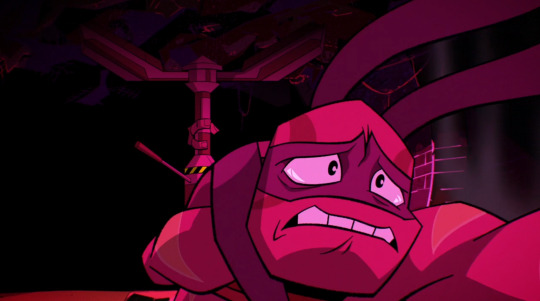
And I think when he lost her it left a deep scar.
I saw posts talking how Leo wants for things to get back to normal and pretend nothing happened, which I completely agree with. I think it's in big part because of his fear of repeating losing a close one.
He REALLY doesn't want to even acknowledge death.

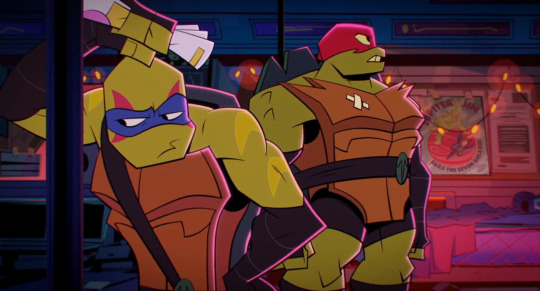
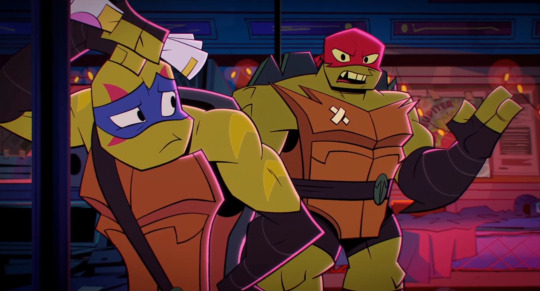
Here Raph seemed to be getting through to Leo-

-but the moment he mentions possibility of his family dying?
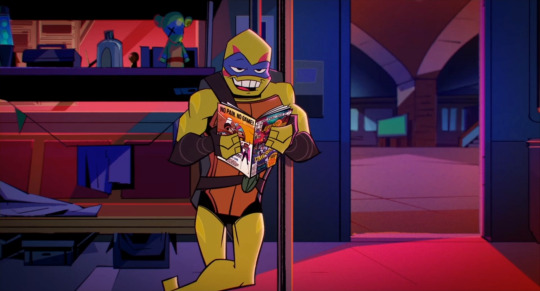
Nope, time to deflect, joke and feign ignorance.
Leo's aware that death is a big part of being a responsible hero and that's why he'd rather goof off with his brothers and not train.
Because obviously when you ignore something it just dissapears, right? So if they ignore severity of certain situations and possibility of dying it won't happen, right?

If they don't treat it seriously they'll be fine! Totally!
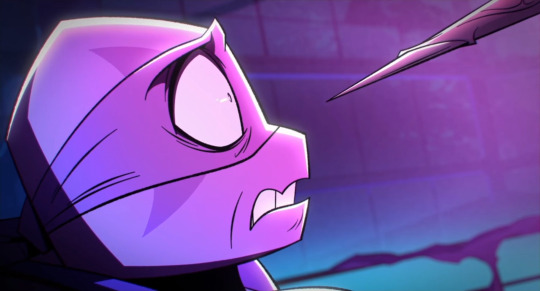

Then Raph shields Leo from the Krang and sends him away.
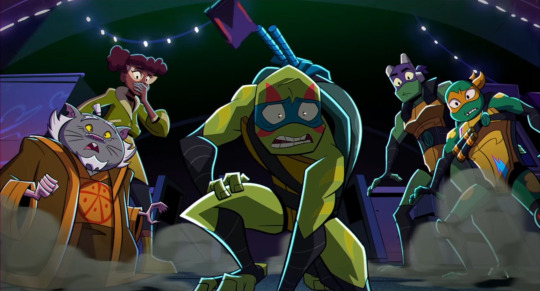
And it's as if Karai's death stared right in his eyes.
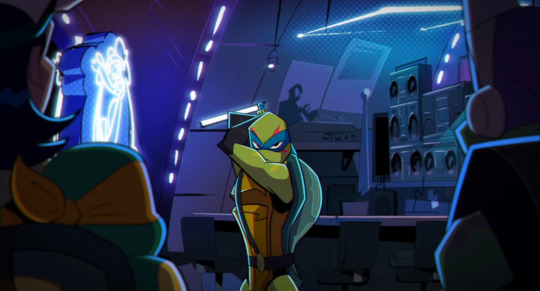
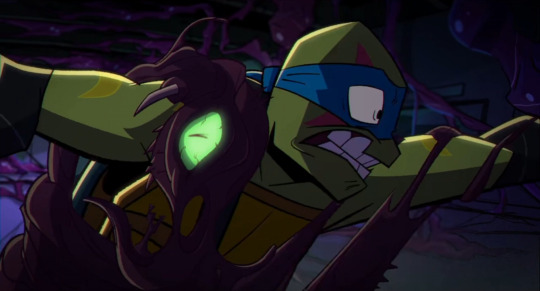
So Leo picks up the slack of leadership in order to save Raph. He behaves carelessly during this time but can you really blame him, he desperately wants to save his brother, to stop yet another family member from death that he is so scared of.

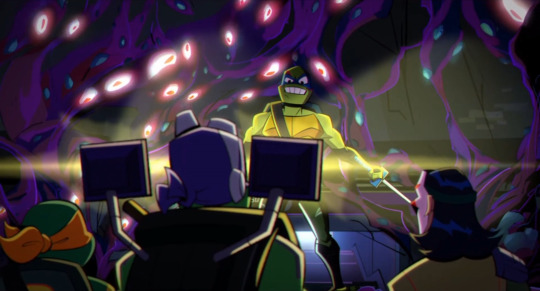
He still tries to be positive and nonchalant, that "pfff obvioulsy everything will turn out alright!" but at the end of the day, it's not that simple.
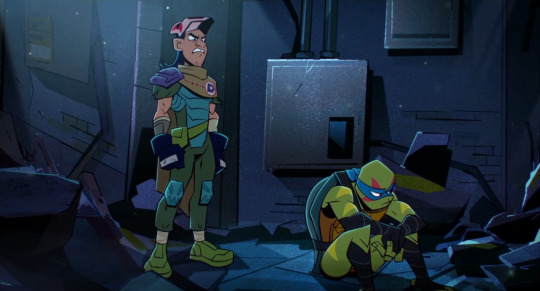
Casey's speech had hard time to really hit Leo, he's still avoiding confronting resposibility, literally and metaphorically turning away from it. But the moment Casey says Leo's whole family died?
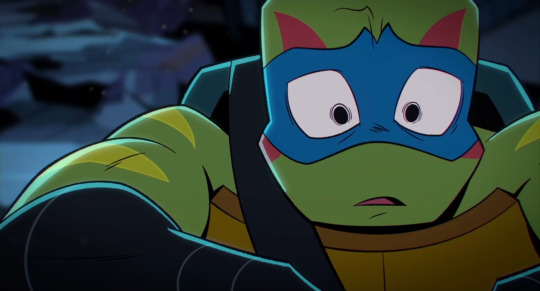

Now that made an impact.
And every time his family is in terrible danger he looks absolutely terrified and basically every time Leo has to be dragged away to not just return and try to save them again.
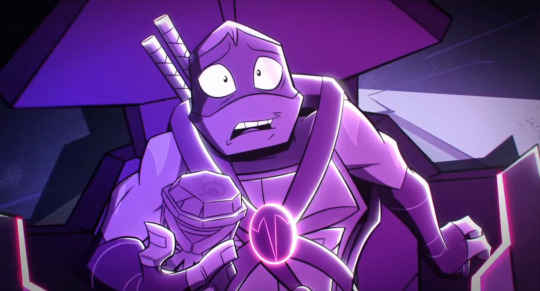
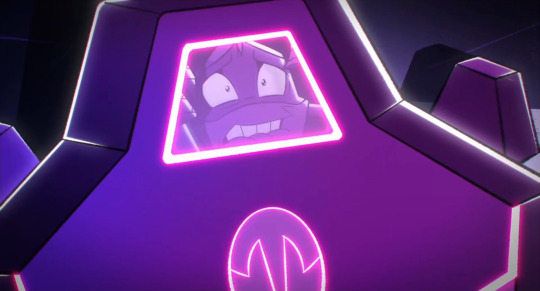
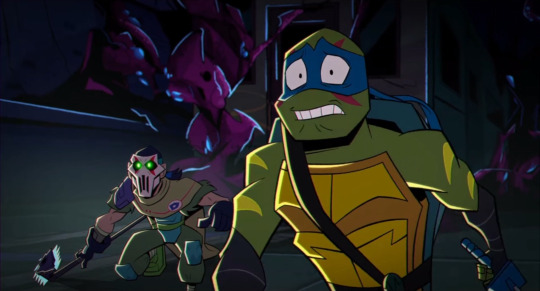

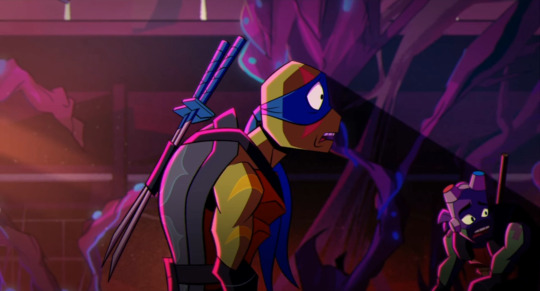
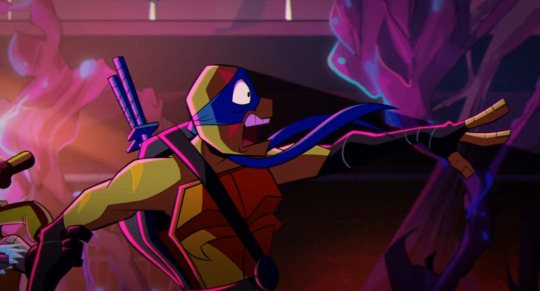
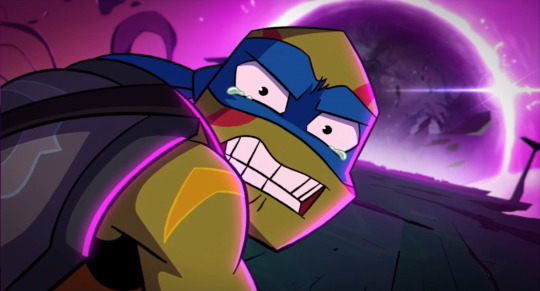
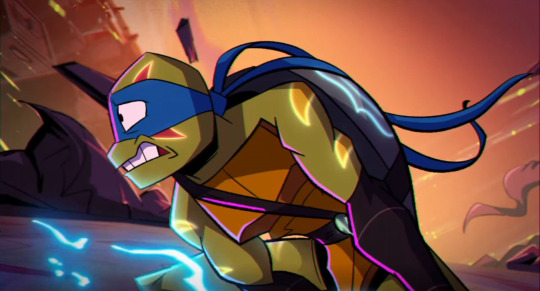
And when there's nobody to drag him away?
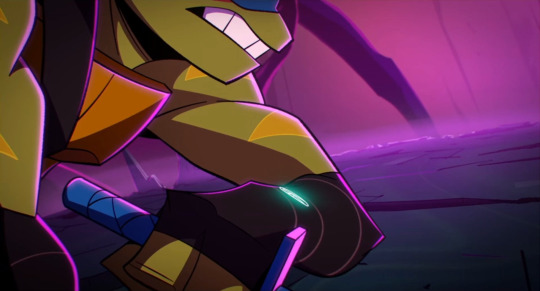
First thing he does is sacrifice himself. Because I don't think Leo is scared of his own death, or at least he is not as scared of him dying as his family. He'd rather give away his life than live through another grief.
Obviously I'm not sayin that the rest of the fam isn't terrified of close ones dying. But while they seem less aware (Mikey) and/or more ready for the possibility (Raph)...
Leo's wholly aware but he'd rather not be and ignore his fears until he can't anymore.
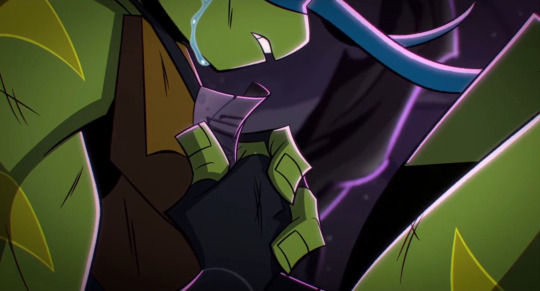
#rottmnt#rise leo#long post#don't mind me just trying to explore leo's avoidance#analysis#it thinks!#oh btw interesting that both karais sacrifice and raphs both have these pink tinted color palettes#idk if im saying something obvious but ive had this on my mind for so long i had to write it down
3K notes
·
View notes
Text
Oughh it’s 2:00 AM and I’m having Thoughts and Emotions about Marceline the Vampire Queen. Like— she’s a punk bisexual and cool as heck but she’s also a terribly sad immortal with mom issues and double dad issues BUT BUT ALL of her parental figures gave her unconditional love so strong that it fundamentally saved the human race. Marceline saved the humans who hated her because her demon dad passed on the legacy that helped her grow powerful and her mom sang her lullabies and her adopted father clung to every shred of his breaking mind to protect her childhood. She was so loved! She was so loved! And that love never went away it stayed inside her even when all three of her parents hurt her so badly that the pain stuck for a thousand years. And all of the ways they hurt her were BECAUSE they loved her, so Marceline never learned to differentiate what it meant to love someone and hurt someone. So she hurts the people she wants to protect, she’s rough with the people she wants gentleness from, she abandons the people she wants by her side. And so much of the show is her collapsing and falling apart because she can’t figure out why why her relationships are all so broken. And then little by little she gets closure with each chapter of trauma— with her demon father, with her mother’s memory, with dear Simon— which then allows her to finally be at peace with herself and accept love— pure as it is— and give it back.
#adventure time gets the congrats for writing the saddest characters in the world award#haven’t even delved into my Fern rant cause I implode each time#and Simon Betty! Ow ow ow!#Minerva…#I will never get over how intricate and human and layered and complex AT’s writing is#phenomenal speculative fiction world building and character writing#In a cartoon that set the precedent for stupid fart gags#anyways if you’ve read this far into the tags marceline is my baby girl and she really really needs a hug#marceline the vampire queen#marceline#adventure time#at#adventure time analysis
483 notes
·
View notes
Text
I posted this on my Twitter, but I thought I'd share it here, too! I isolated the audio from Charles' death scene to answer a commonly debated headcanon in fandom: did Charles go by something else when he was alive?
Well, at least in this video, I can confirm that all the "Friends" who killed him call him Charlie. 😭
I reckon that is what his peers, teachers, and, even his abusive father likely referred to him as... Charlie Rowland. Makes sense for a teenage boy in the 80s; particularly a sporty, alternative, charismatic boy like Charles who hung around "lad-types."
It's no wonder he flinched when Brad/Hunter called him Charlie Boy. This show really doesn't miss a single detail. It's brilliant and intentional in every single thing it does.
FUCK it deserves a season 2! It's so well-written and in its first season. *Chef's kiss* from beginning to end.
#I was writing a fanfic and needed answers so I went looking and found this by complete accident. Weeping rn my poor boy#don't even get me started on why Edwin doesn't call him Charlie I got a whole ass opinion on that too!!!#dead boy detectives#charles rowland#the dead boy detectives#the dead boy detective agency#dbda analysis#dbda meta#dbda
1K notes
·
View notes
Text
Something I've always found kinda interesting about Red and Green in gameverse is how they turn some of the Stock Shōnen Protagonist/Rival tropes on their heads.
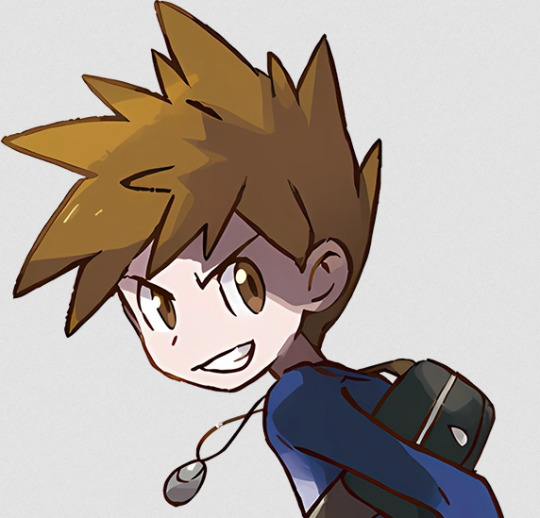

This is really long character analysis of these two and various media counterparts of theirs, so I'm gonna stick it under a cut.
In some ways they fit their roles quite well - aside from the obvious colour associations, you have Red as the hero whose sense of justice is stronger than his sense of self-preservation, and you have Green as the privileged rival who cares about beating Red above all else.
But, if you look at it another way - Green's got the light spiky hair, the hot-headed and boisterous personality, the drive to Get Better And Win. He's designed to read as really open and chipper, yet snarky. Sure, he isn't dumb, but he's arrogant, and he's got something of a one-track mind; the guy finds himself in the middle of a hostage situation because he's just that hellbent on fighting his rival, and does not seem to be thinking about anything else. He's also got a motivation - given how the Professor talks to him in the championship room and supplementary material like his Generations appearance, it's not a stretch to think the reason he's so driven to Get Better And Win is to prove himself to his grandfather. It's shown in later games and supplementary works that he's become somewhat of a mentor as he got older and wiser.
Red, on the other hand, is a quiet loner whose only motivation seems to be to get stronger for the sake of getting stronger. He's level-headed and dark haired, his cap rounding off his edges and obscuring his face. He's heroic, but not really sociable, as evidenced by the fact he spends the Johto games alone on a mountain without having told anyone where he went. He seems isolated in a way that later games' protagonists really don't. He may have always been a step behind Green, but he's always better.
Equally fascinating to me is how other adaptations have changed the base designs around and rewritten personalities to suit different purposes, while still being visually recognisable as counterparts to their game-selves.

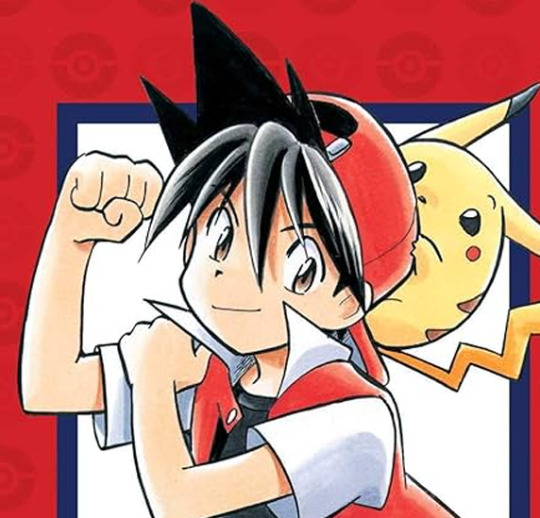
For example: Red and Green's counterparts in Special slot WAY more neatly into their stock shōnen roles, with Red as the boisterous hero and Green as the broody rival, and it's reflected in their new designs.
Red's hair becomes spiky to reflect his more excitable nature. His hat, in turn, never obscures his face; it's always either tilted back to accommodate his fringe or turned backwards. Green's hair, on the other hand, is not quite as spiked upwards and instead falls into his face, frequently obscuring his far eye in the same way game!Red's hat does.
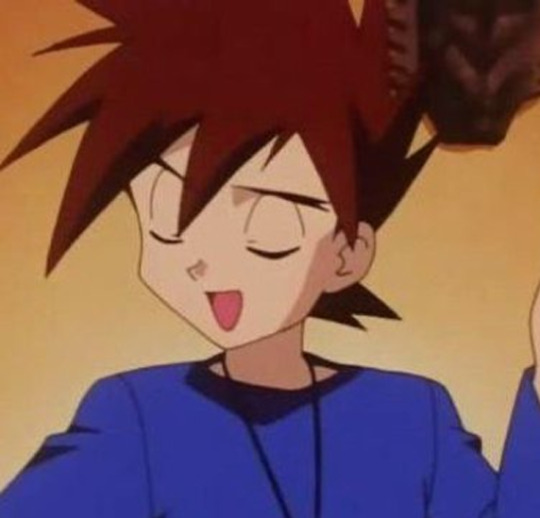
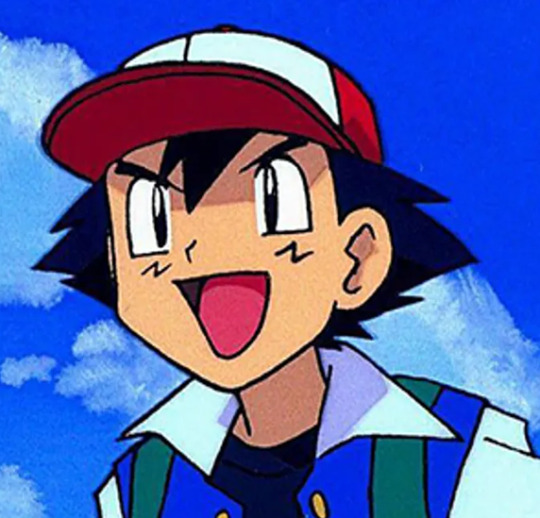
And then, of course, the anime balanced them in a totally different direction.
Instead of scrapping Green's personality wholecloth, it's become exaggerated in Gary. He's not the broody antihero rival, he's the arrogant, privileged, better-than-you rival. He's always ten steps ahead of Ash, always pisses him off, and is ALWAYS better until the end of his run. The anime also emphasises his intelligence far more, with him doing things like rattling off dex info and the speed of light in mph off the top of his head, to further contrast him with Ash.
Ash, who is of course THE shōnen protagonist. He's dumb, but determined, and always ready to help people in need. Unlike game!Red, the power of friendship (with more than just pokémon) is central to him; any given season of the show is defined as much if not moreso by his travelling companions and interpersonal relationships as it is by whatever he's actually doing.
It's funny to me, though, how most adaptations seem to find the fact that gameverse Red and Green have swapped some stock roles as something to fix. Even Origins, which is probably the closest a high-profile adaption has come to game-accurate, made its version of Red louder and more standard-hero-esque.
I'm not knocking any of these things, of course, just observing. I adore both Special and anipoke. I just think that the way the game characters are written could lead to some interesting dynamics were it to be explored more.
#pokemon#reguri#pokespe#pokeani#anipoke#trainer red#rival green#blue oak#dexholder red#dexholder green#ash ketchum#gary oak#character analysis#sorry not sorry for writing an essay on a whim. it will happen again#namelessshipping#originalshipping#palletshipping#kindanotreally#but i think yall will appreciate my char analysis of them as a dynamic yknow. i am one of youse#dent's meta
2K notes
·
View notes
Text
Daisuke’s Death and the Invisible Abuse of “Privileged” Children
tw: extensive discussions of child emotional abuse
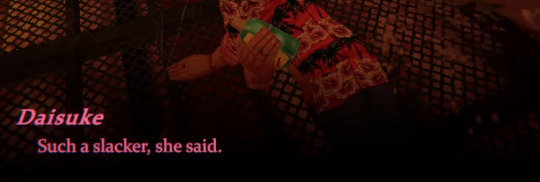
Another mouthwashing text analysis before I post any polished art? Shocker. But I really really appreciate the reception on my Swansea post, especially as a new account! This Daisuke-centric analysis is gonna be a quick one (< this was a lie. long read ahead!) but he is a character who resonates deeply personally with me as a victim of childhood abuse that resembled some of his experiences. I do plan on doing a larger analysis of his character, but the abridged version necessary for this piece goes as follows:
Daisuke’s treatment in the narrative—both his implied home life and Jimmy’s taking advantage of him to go into the vent—is another one of this game’s excellent portrayals of normalized (and thus invisibilized) abuse. Children are often cited as one of the most vulnerable classes of people, if not the most vulnerable (I acknowledge that Daisuke is not a child, but Mouthwashing implies that this narrative of his inadequacy has persisted throughout his upbringing and, to this day, he is dictated tasks and lacks independence, treated like a dependent. His youth is also an undisputed feature of his character and, most importantly, the cast treats him like a kid). Children’s dependency on adults and our willingness as a society to accept that the adults in their lives provide the most objective perspective on these young people renders them particularly prone to abuse easily swept under the rug or “justified” by wardens who possess the power to dictate the narrative. Jimmy’s engagement with Daisuke is an extension of the latter’s vulnerability. The co-pilot’s assertion that “he’ll be fine (…) mommy and daddy have him covered” at the birthday party represents a deference to Daisuke’s parents as adequate caretakers who will ensure his longevity and comfort on the basis of their wealth. And we know that Daisuke’s parents think the same—the Q&As reveal that they believe they are doing the best to secure their son a good future. However, the same Q&As indicate that they don’t actually engage with or understand Daisuke’s interests and that their approach to parenting him is entirely understood through their personal beliefs, not those of their son. And Daisuke clearly carries that quite close to his heart. He seems to struggle with identity and acceptance, seeking validation in the form of praise. Daisuke is defined through what he can do for others and not what he independently brings to the table, because that has never mattered where he grew up. The consequences of his parents’ failure to meet his emotional needs ultimately conditioned Daisuke to be perfectly available to be taken advantage of in a corporate setting defined by capitalist attitudes and hierarchies.
While it’s not concrete to say that Daisuke grew up in an emotionally abusive household, it is most important that we cannot dismiss the possibility and that his behavior as the outcome of some obvious degree of neglect is well-aligned with this theory. Moreover, the young man who comes out of that household is easily targeted by Jimmy’s abusive tendencies as a direct result of what he internalizes growing up. Daisuke is apparently financially well-off (contextually we can’t be sure if Daisuke’s family is upper class, middle class, or somewhere in between), and with that comes privilege. Even the way he packs—multiple personalized outfits, entertainment devices, etc—reveal that he’s used to certain comforts and hasn’t yet acclimated to the harsh expectations of companies like the Pony Express. But, especially where young people are concerned, it is all too easy to allow this privilege to act as a curtain between abuse and the outside world. We can acknowledge the privilege that he undoubtedly enjoys and also recognize that it benefits his parents much more than it benefits him as a young person.
Emotional abuse is complex and extremely damaging and Daisuke *does* show symptoms of at least being constantly verbally accosted and emotionally neglected by his parents to the point of permanently warping his sense of self. It also generated his overreliance on authority figures to tell him how to keep himself safe in their world. His mother apparently insulted him to his face (“such a slacker, she said”, and being reprimanded for being too talkative [from the Daisuke teaser]), and a lot of his negative self talk (“total screw-up”, “fuck up”, etc) is reminiscent of how people define themselves by parroting what they are called after internalizing consistent externally-imposed definitions of their identity. While these are not surefire indicators of abuse and I am not willing to diagnose a situation as abusive purely predicated on these factors, the behaviors Daisuke exhibits as a result share many commonalities with those of victims of childhood abuse. In fact, just about every time Daisuke speaks about himself in Mouthwashing, he mentions his failures and his work. It’s not lost on me that the teaser for the whole character is him pondering his mother and how she might not recognize him if he isn’t noisy and obnoxious. He personally puts a lot of stock in their assessment of him as lazy and annoying, but nevertheless tries to accomplish learning through the internship. Furthermore, Daisuke takes on a lot of his mother’s pain, hoping she doesn’t blame herself for the negative things that happen to him (even though in the same scene he reveals that she’s the reason he’s on the stranded Tulpar at all), indicating that he has taken responsibility for the feelings of people in his life even when those people are not his to care for and even bear responsibility for his pain.
Now in young adulthood, Daisuke rarely seems to have any sense of self beyond his parents and his work aside from one-off quips about baseball and babes. It suggests that he has always had to prioritize his parents’ desires growing up to avoid being treated unfairly and even cruelly, stunting his self-discovery. In abusive situations, your understanding of safety and your pursuit thereof are radically impacted and we see this manifest in Daisuke’s continuing willingness to accept those in command as the pinnacle of safety over what one might consider logical, personal acts of self-preservation. He equates safety with obedience, and I contend that that equivalence suggests a lot about how his parents reprimanded deviance from their plans. And not to be that guy, but it is kind of outright cruel to dump your utterly inexperienced teenager-to-early-20-something on a 1 year, no contact, unsafe space voyage in a failing industry knowing that he doesn’t have the necessary skillset yet. That’s what his parents do when they aren’t satisfied with his progress, and it’s intense and disproportionate and alarming! Especially for the dependent! They toss him into the deep end of the corporate machine and insist he learns to swim in such an oppressive, stifling atmosphere. It’s no surprise that he drowns, especially when he himself can’t recognize this as an unrealistic expectation and tackles it with everything he’s got because his parents are theoretically always right about what he needs. I don’t think it’s a stretch to say that normalized emotional abuse from the home and how it maps onto a victim’s adult life is a topic Mouthwashing would endeavor to touch on, because visibilizing invisible abuses of power in heteropatriarchal capitalist schemes is arguably the central undertaking of the game.
I don’t think Daisuke has evil parents or anything, rather that what we accept as “good parenting” and “good mentorship” is often negligent with regard to emotional needs and can easily become a source of heavy trauma for the children and mentees if that emotional aspect is stretched too thin in the pursuit of success. Not all abuse is intentional, and the dev Q&As imply that Daisuke’s parents thought they were sincerely investing in his future. They cared, just not in the best way for his wellbeing. Because capitalism emphasizes the individualistic pursuit of success above all else, it’s no wonder that a parent would think that the best thing they can give their kid is an avenue to prosper financially. But in doing so, Daisuke’s parents deny him the opportunity to define himself, to experience agency, and to build up confidence. Effectively, they create a young man so vulnerable to abuse by higher-ups (a manifestation of abuse that is often intentional at the systemic level) that he decides to climb into that vent at Jimmy’s discretion under the pretense that he will make somebody proud. Because that’s how Daisuke has been raised to understand himself and his place—the presumed screw-up boy as a default, making you proud by doing the right thing, who has learned to pursue that achievement to avoid the condescension and disproportionate backlash (e.g. the internship itself) that comes with failure. Everything circles back to his parents’ expectations that he makes for a good worker. When the cocktail knocks Swansea out, Daisuke makes an offhand comment about getting a bad reference—even in the most dire of circumstances, he can’t stop thinking about their capitalistic expectations for his “good” future.
I find that Daisuke really is such a good subtle portrayal of how parents with resources can get away with emotionally stunting their children because we perceive their ability to put a roof over their heads, food on their plate, etc as adequate parenting and even a privilege for the child when it should be the bare minimum. Jimmy certainly buys into it, and even some of the fandom parrots that, really and truly believing Daisuke is some good-for-nothing kid who doesn’t try hard when all we see is him working, including climbing into the vents to try and help despite not being assigned the work (foam scene, not his death). I find this reception shows how inclined we are to accept those narratives of the privileged child’s inadequacy before we address the parent for not fulfilling a child’s emotional needs, which are just as important if not more than the material.
To wrap this up with a quick discussion of the symbolism of his death in the context of the emotional abuse of children (which is the reason I made this whole post but I can’t talk about this guy without going off): Daisuke getting so badly injured trying to do what���s right is a very physical manifestation of the suffering he was already going through. It is the pain of constantly people-pleasing and of holding it all in when he’s lashed out at. He gets injured at all in the pursuit of appeasing Jimmy and (theoretically) Swansea, both of whom he blindly trusts despite how they treat him because he has always been expected to just adhere to the adults with authority in his life. Being talked down to by them is not new and has never been a reason to question their judgement. Daisuke sees this as a product of his own inadequacy as implied by other people, and not of external cruelty. He was raised not to question the system for fear of repercussions.
Jimmy is perfectly situated to coerce him into a dangerous situation because Daisuke has never been taught to say no. The safest option for a scared child is to trust their mentors, and an adult Daisuke does just that. Even Swansea’s teachings of safety are dismantled by Jimmy’s tactical use of captainhood to break the camel’s back. Authority. Daisuke must always listen to authority. Jimmy knows the vent isn’t safe. Swansea tells him directly and he observes the foam incident (if from a distance). For as much as he acts like he cares about taking responsibility for Daisuke’s safety, his individualistic pursuit of “fixing” things manifests in Jimmy again taking advantage of a vulnerable person on the ship. Jimmy doesn’t reconcile Daisuke’s eagerness to help with lessons on safety like Swansea does, but rather uses it only when it benefits him. Daisuke is taught by his upbringing to accept this kind of treatment—for safety, defer to the leader in the room even if it hurts and you don’t want to do it (just like he didn’t want to be on the Tulpar in the first place).
Then, once the intern is out of the vent and mortally wounded, Jimmy applies the mouthwash (a product to be sold, hauled in the interest of the corporation) to “help” sanitize the wounds. But the sugar content negates medical utility and only worsens the pain. We can interpret this as the application of material privilege, “sweetness”, that wasn’t actually any help at all to solve the deep wounds left by emotional pains. Mouthwash rids you of the bad taste but doesn’t kill all the underlying germs. One could argue further that in this scene, the mouthwash is specifically representative of the Pony Express internship: a rare stepping stone in the corporate hustle gained through privilege and presented as a boon. Like the mouthwash, the internship is imposed on Daisuke to try and “help” him succeed and be better, but it only elevates the pain by irritating the wounds and ends in his agonizing demise. However, this fine-tuned comparison isn’t necessary to my point. I find the broad implications of the mouthwash as an antiseptic immensely representative of parents and caretakers who don’t seem abusive to the outside world but who are actually subversively hurting their children and ultimately conditioning them to be victimized by capitalist attitudes. Our deference to material comforts and corporate opportunities as indicators of wellness renders us blind to where caretakers fail to address the emotional needs of young people. At the end of the day, Daisuke is still killed by the values his parents have instilled in him. It’s always the “captain’s” (literal or figurative) orders that seal the deal and cut off any of his autonomous doubt or dictation (for example, his desire to listen to Swansea and not go in the vent). His parents’ symbolic and saccharine gestures mean very little in the scheme of creating a person who can survive the pressures of the “real world” when malicious actors (JIMMY.) and the capitalist enterprise as a whole bear down on the cracks of an emotionally taxing youth.

A/N: Maybe I’m thinking about all of this too hard, but the beauty of Mouthwashing is that I’m never quite sure that’s the case as this game feels so deliberate. Anyway, as somebody who has clinically diagnosed PTSD stemming from childhood, this has always been a really important analysis to posit and I finally found the time to put it into words. I feel like Daisuke as a symbol is often overlooked by the fandom. He’s enjoyed, yes, but not really broken down like the others are. That diminishing of his importance and his feelings about the situation also feels like a symptom of his age. But that’s neither here nor there—like I said, I believe I could do a much more in-depth analysis of Daisuke as a victim of subtle abuse but this will have to do for now. A lot of my major points have been made, anyway! Perhaps video format would be best for something longer-form. 🌺
#.txt 🌊#mouthwashing#mouthwashing analysis#daisuke mouthwashing#not tagging Jimmy but he’s mentioned here#mouthwashing game#oh my god this is so long I’m so sorry#I have an actual class essay to write but here’s daisuke mouthwashing I guess
527 notes
·
View notes
Text
why was he so excited

he wanted to show off to pookie so bad

spot the difference 🤨
don’t even get me started on the angst potential of this 😿🙏
he was so happy before everything happened 🙁
#do you guys like my mediocre editing skills 🥺#bruhh someone give me ‘Erik is a happy bunny’ stuff i need this man to jump up and down from time to time#how tf do people write in depth analysis for these kinda things#cherik#erik lehnsherr#magneto#charles xavier#professor x#x men#wish does not shut up#xmen first class#xmcu
421 notes
·
View notes
Text
Flowey’s so funny and has me so fucked up like he’s a talking flower. He tries to kill you upon your first interaction. He is ten years old. He is damaged beyond repair. He’s a flower named Flowey. He’s become friends with every single character. He’s killed all of them countless times. He knows everything about everyone. He doesn’t care anymore. He takes care of his mom when she can’t take care of herself. He’s killed her before. He doesn’t care if you kill her. He thinks she’s trying to replace him. He just wants to be himself again. He wants to destroy everything. He hates you. You’re the only one who understands him. He wants his best friend back. He’s terrified of them. He believes in kill or be killed because he died by giving mercy to the wrong person. He believes himself to be the wrong person. He doesn’t understand when you show him that kindness he showed others, even when you know he could kill you for it. He’s tried every route. He asks you if you have anything better to do when you try to do the same. He’s a direct reflection of the player. He’s a fucking talking flower named flowey and his only voice line is by Ronald McDonald and his officially licensed plush does a little dance for you
#‘Flowey would listen to i bet on losing dogs by Mitski and cry until he throws up and Chara calls him cringe from beyond the grave’#-me to my friend when I ranted about this last night#he has me so fucked up like oh my god#how is the best character a fucking talking flower#I love undertale’s writing so much like it’s mastered minimal evidence giving away the biggest parts of characters#i can analyze him i can study him under a microscope#i can put him in a terrarium with a sticky note that says gay baby jail you know#he has me SO fucked up#flowey#flowey the flower#asriel#asriel dreemurr#I’m talking about flowey btw not asriel i know they’re the same person but not to me#like how i consider little baby me and fucked up 13 year old me different people#asriel sits on the playground and cries when nobody wants to play warrior cats with him#and flowey sits in the back of classrooms and answers ‘life is MEANINGLESS’ to every question#not speaking from experience ofc (im lying)#love my edgy flower *puts a magnifying glass up to him and notes how fucked up he is*#i think more characters need to be fucked up beyond repair#undertale#utdr#character analysis
7K notes
·
View notes
Text
"Toshiro Is Sexist," "Toshiro Owns Slaves": What's Really Going on With This Guy?
I've seen a lot of debate on whether or not Toshiro is problematic because he's a slave owner or because he's sexist in the context of his crush on Falin. While I do want to examine his relationship to Falin, I'd like to take a few steps back and unpack his upbringing first. We'll dive into the gender and class dynamics he was raised with and how it impacts his behavior in the main storyline.
Like all people, Toshiro is shaped by the environment he grew up in. Toshitsugu, Toshiro's father and the head of the Nakamoto clan, is the most impactful model of authority and manhood in his life. Toshiro does recognize some of his father's flaws and tries to avoid replicating them. But whether or not he emulates or subverts his father's behavior, Toshitsugu is often the starting point for Toshiro's treatment of others, particularly marginalized people.

The Nakamoto clan exists under a patriarchal hierarchy with Toshitsugu at the top. As noted by @fumifooms in their Nakamoto household post, his wife has more authority than Maizuru. She's able to ban Maizuru from parts of their residence, but despite disliking his infidelity, she can't divorce him or stop him from cheating on her. Their marriage is not an equal partnership.

On an interpersonal level, Toshitsugu and Maizuru also have a fraught relationship. While she does seem to care for him, she's often frustrated by his thoughtless behavior.
For example, he drunkenly buys Izutsumi for her — without considering how she'll have to raise this child — and invades her room in the middle of the night. When he cryptically says, "It's all my fault," she replies, "I can think of a lot of things that are your fault." She calls him an "idiot" and "believes that [Toshiro] will grow up to be a better clan leader than his father," implying that she takes issue with Toshitsugu's leadership.


Because Maizuru and Toshitsugu are described as being "in an intimate relationship" and "seem[ing] to be lovers," Maizuru appears to be a consensual participant. Still, this doesn't negate the large power imbalance between them as a male noble clan leader and his female retainer. This imbalance introduces an insidious undertone to Maizuru's frustration with Toshitsugu. Like Toshiro's mother, Maizuru doesn't have the agency to do as she pleases in their relationship; he has the ultimate authority. For instance, she doesn't seem to want to raise Izutsumi, but she has to anyway.

While Maizuru's role as Toshitsugu's mistress is significant, she's also the Nakamoto clan's teacher and Toshiro's primary maternal figure. She cares deeply for Toshiro: tailing him, feeding him, and taking responsibility even for his actions as an adult. While it might seem sweet that she cares for him like a son at first, Maizuru was notably fifteen years old at the time of his birth. In the extra comic below, he's six years old and has already been in her care for some time. Even if we're being generous and assuming that she didn't start raising him until he was six, she was still only twenty-one at the time she was parenting her boss/lover's child with another woman.

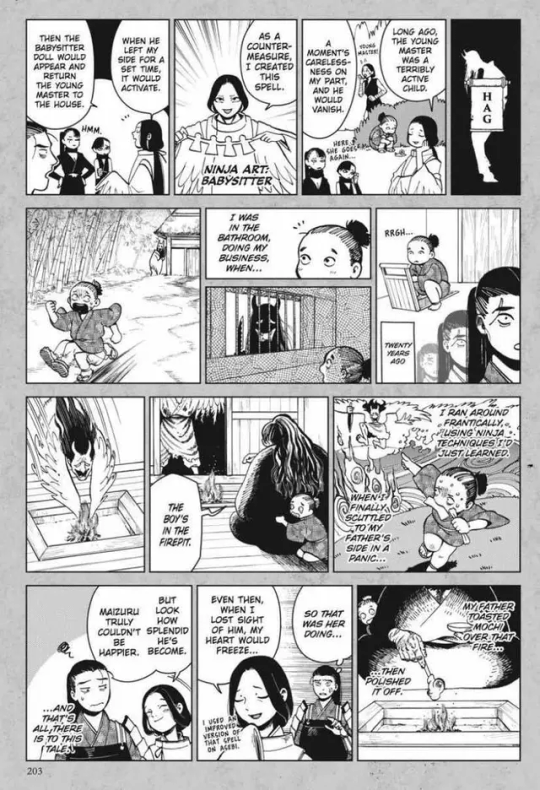
Maizuru's roles as mistress and maternal figure, in addition to her role as retainer, demonstrate the intersection between gendered and class oppression in the Nakamoto household. Despite her original role being a retainer trained in espionage, Toshitsugu presses her into performing gendered labor for him and eventually, Toshiro. She's expected to be Toshitsugu's lover, perform emotional labor for him as his confidant, care for his child, and carry out domestic tasks like cooking. She says, "Even during missions, I was often dragged into the kitchen." If she was a male servant, I doubt she would have been expected to perform these additional tasks. She can't avoid these tasks either, stating that her "own feelings don't factor into it."


Toshitsugu disregards his wife's and Maizuru's desires and emotions to serve his own interests. Because he has societal power over them as a nobleman and in Maizuru's case, her master, neither woman can escape their position in the household hierarchy.
As a result, Toshiro grew up within a structure where men and male nobility, in particular, wield the most societal power. The hierarchical nature of his household and society discourages everyone, including him as a clan leader's eldest son, from questioning and disrupting the existing hierarchy.
The other Nakamoto household members also internalize its sexist, classist power dynamics.
For example, Hien expects that she and Toshiro will replicate the uneven dynamics of the previous generation, regardless of her personal feelings. She sees her and Toshiro's relationship as paralleling Maizuru and Toshitsugu's relationship; she is the closest woman to Toshiro and his retainer, so she's shocked when Toshiro doesn't attempt to begin an intimate relationship with her. Notably, she doesn't have actual feelings for him. Her expectations are centered around the household's precedent of placing emotional, sexual, domestic, and child-rearing labor onto the female servants without any regard for their personal desires.
Hien also probably knows that her position in the household will improve if she is Toshiro's lover because she's seen it improve Maizuru's position. However, the fact that being the future clan leader's lover is the closest proximity she, as a female servant, has to power further reveals the gendered, class-based oppression she and the other women live under.

It's important to note that the Nakamoto clan bought Benichidori, Izutsumi, and Inutade as slaves, so they have less power and agency than Maizuru and Hien. The clan further dehumanizes Izutsumi and Inutade as demi-humans; their enslavement contains an additional layer of racialization.

Toshiro isn't oblivious to the gendered, class, and racial power dynamics of his household. He tries to distance himself from participating in its exploitative power structure. He walls himself off from Hien, who he's known since childhood, to avoid replicating his father's behavior and making his servant into his lover. He disapproves of his father's enslavement of Izutsumi and Inutade, and he lets Izutsumi go when she runs away in the Dungeon.

But does any of this absolve him of his complicity in his household's sexist, classist power dynamics and racialized slavery?
The short answer is absolutely not.
Despite his distaste for his father's exploitation of his servants and slaves, Toshiro still uses them. He refers to his party as "his retainers," and he has them fight and perform domestic tasks for him. You could argue that Toshiro doesn't like to and thus, doesn't regularly use his servants and slaves. In the context of him asking his retainers to help him rescue Falin, Maizuru says, "The only time he ever made any sort of personal request was for this task." But it shouldn't matter whether exploitation is a regular occurrence or not for it to be considered harmful. Toshiro asking Maizuru to cook him a meal still constitutes asking his female servant to perform gendered labor for him. He's also very accustomed to her grooming and dressing him.



Maizuru sees feeding, washing, and even advising Toshiro romantically as fulfilling Toshitsugu's orders to care for his son. They aren't fulfilling a "personal request." But just because her labor has been deemed expected and thereby devalued doesn't mean that it isn't labor or that she isn't performing it.

Maizuru's dynamic with Toshiro is also complicated by her role as his maternal figure. She loves him and wants to take care of him, and she doesn't have a choice in the matter. During Toshiro's childhood, the onus was on Toshitsugu to cease exploiting his lover and release her from servitude, but Toshiro is now an adult man. Seeing as how Maizuru defers to his wishes and calls him "Young Master," they still have a power imbalance that he's passively maintaining. Ideally, he would not ask anything of her until he has the authority to release her from servitude.
Throughout the story, Toshiro acts as if he has no agency and quietly disapproving of his father's actions absolves him of his participation in maintaining oppressive dynamics. While his father still ranks higher than him, he's essentially his father's heir. He has much more power than Maizuru, the highest-ranked servant. At the very least, he could leave his slave-owning household.
Unfortunately, his refusal to confront injustice is consistent with his character's major flaw: he does not express his opinions, desires, or needs. While this character trait obviously hurts his friendships, it also furthers his complicity in the injustices his household runs on.
Toshiro's relationship with eating food — the prevailing metaphor of the series — also parallels his relationship with confronting injustice. Maizuru mentions that he was a sickly child, so the act of eating may have been physically uncomfortable for him. As an adult, his refusal to eat crops up during his rescue attempt of Falin. Denying himself food might have been punishment for not accomplishing important tasks like rescuing Falin and/or a way to maintain control over something in his life when he felt like he'd lost control over the rest of it, again in the context of losing Falin. (Note: I suggest reading this post on Toshiro's disordered eating by @malaierba.)
But he cannot and does not avoid consuming food forever.

Similarly, Toshiro keeps his distance from his retainers and tries not to use them until the Falin situation occurs. His efforts to avoid exploiting his retainers amount to inaction — things he doesn't ask of them or do to them. But his inaction does nothing to dismantle the existing hierarchy that places his retainers under his authority, denies them agency, and often marginalizes them as not only servants or slaves but as women, and he ends up using them as servants and slaves anyways.
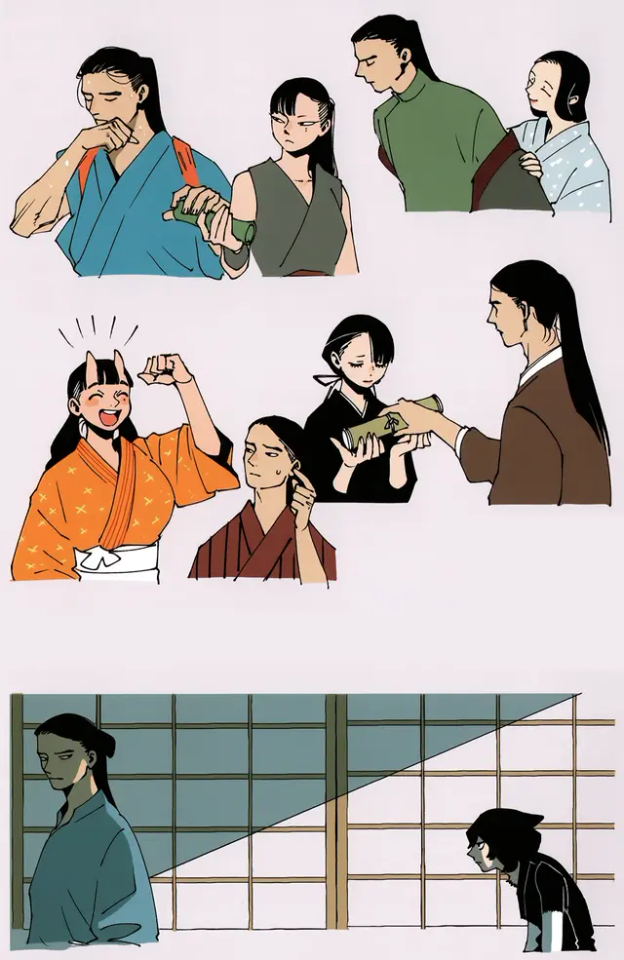
Returning to the narrative's themes of consumption, Toshiro cannot avoid eating just as he cannot avoid perpetuating the exploitative system of his household. The Nakamoto clan consumes the labor and personhood of those lower in the hierarchy. The retainers' labor as spies and domestic servants is the foundation of the clan's existence. Thus, the clan consumes their labor to sustain itself.
Within this hierarchy, the retainers' personhood is also consumed and erased. As Izutsumi describes, they are given different names and stripped of their agency to reject orders or leave. Maizuru and Hien also say their feelings are irrelevant in the context of Toshitsugu's and Toshiro's wants and needs. Both women are expected to comply with whatever is most beneficial and comfortable for the noblemen. Clearly, despite Toshiro's detachment from his household's functions, these social structures remain in place and harm the women under him.

Although we know the Nakamoto clan has male retainers, the choice to highlight the female retainers seems intentional. We're asked to interrogate how not only being a servant or a slave in a noble household impacts a person's life and agency, but how being a woman intersects with being a member of some of the lowest social classes.
Toshiro only distances himself from his father's behaviors of infidelity and exploitation so long as it doesn't take Toshiro out of his comfort zone. He doesn't free his slaves. He's far too comfortable with his female retainers performing domestic labor for him, and he barely acknowledges their efforts; they're shocked when he thanks them for helping him save Falin. He hasn't unpacked his sexist (or classist or racist) biases because he perpetuates his household's oppressive hierarchy throughout the narrative. Considering all of this, he inevitably brings this baggage to his interactions with Falin.

Falin is presumably one of the first women he's had extended contact with that isn't his relative or his family's servant. Because of his trauma surrounding his father and Maizuru sleeping together, he understandably falls for a woman as disconnected as possible from his father and his clan. He seems to genuinely like Falin, respects her boundaries, and graciously accepts her rejection. His behavior towards her is overall kind and unproblematic.
But if Falin had gone with him, she would've likely been devalued and sidelined like the other women of the Nakamoto household. No matter how much he loves Falin, simply loving her cannot replace the difficult work of unlearning his sexism. Love, of course, can and should be accompanied by that work, but by the close of the narrative, we gain little indication that Toshiro acknowledges or seeks to end his part in exploiting and devaluing women and other marginalized people.
A spark of hope does exist. Toshiro expressing his feelings to Laios and Falin suggests that his time away from home has encouraged him to speak up more. Breaking his habit of avoidance may be the first step towards acknowledging his complicity in systems of injustice and moving towards dismantling them.
Special thanks to my very smart friend @atialeague for bringing up Toshitsugu's relationship with Maizuru and the replication of dynamics of consumption and class! <3
#toshiro nakamoto#maizuru#hien#toshitsugu nakamoto#falin touden#izutsumi#inutade#benichidori#shuro#dungeon meshi#dunmeshi meta#dunmeshi analysis#quite literally free my girls#i got so sad after finding that parallel between maizuru and hien both saying their feelings don't matter#reading maizuru's character bio and how she's a brilliant woman#but she's stuck w toshiro's dad like#i'm toshitsugu's number one hater he better watch out#also thinking about how toshiro looked up to maizuru not even his own parents until he found out about maizuru and his dads relationship#that's devastating bro#im entering my clickbait title era LOL i was told my prev titles were too academia pilled and boring sounding#i think i want to write about izutsumi's and inutade's relationships w gender next#delicious in dungeon#dunmeshi#*mine#*meta
882 notes
·
View notes
Text
Sonic is fundamentally unrelatable and unrealistic - and that's a good thing
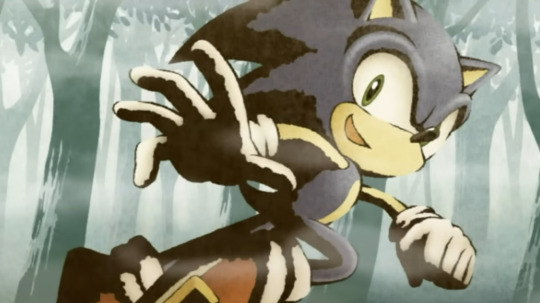
I want to address a common sentiment in the fandom that I've seen countless times over the years - the idea that Sonic should be more humanlike. Specifically, the idea that Sonic should have more human traits, such as anxiety or insecurities, that make him emotionally vulnerable in some way.
I have always felt that this sentiment strips away what I love about Sonic so much—that it goes against his character as someone who is meant to be inspirational rather than relatable. From the bottom of my heart, I truly believe that making Sonic more relatable ruins his appeal and misses the entire point of what role he is meant to fulfill. Sonic being the way he is, an inhuman being that is extremely strong and unyielding mentally and emotionally, makes him an inspirational character that is appealing outside of the realm of relatability.
Please note that I am discussing Game Sonic for this essay, not any versions of Sonic from spinoff media.
(Special thanks to @blurredblu for helping me write this essay!)
Relatability =/= likeability
First, it is important to define "relatability" for the rest of the essay, as what is seen as relatable can vary across countless different cultures and lifestyles.
In this case, we are discussing facets of the human psyche. Traits such as emotional vulnerability, insecurity, or trauma are traits seen as humanlike because they imitate the depth of the human mind. They come across more realistic, and thus relatable to people in real life who have generally gone through emotional hardships.
Relatability is also considered with the implied audience in mind, according to Craft in the Real World by Matthew Salesses.
If relatability were somehow a goal of craft, then the question should be: How can a writer go about trying to make a piece of fiction relatable? If we mean “relatable” as sharing a reader’s experience, the first place to go is audience. We must always ask: Relatable to whom? Which brings us back to the elephant in the room—to call a manuscript “relatable” is really to make a claim about who the audience is or should be.
When writing relatability in fiction, what is important to recognize is who the target audience is. Sonic is a character that was initially created to appeal to a wide target audience, not only meant for young boys but for girls, women, and an older age range in general. When it comes to marketability however, Sonic is almost always advertised towards children, and this demographic is the most pertinent when we look at versions of Sonic written with relatability as a goal. With this idea of the target audience in mind, a character who is portrayed as young and having a childish temperament would be more relatable. The Paramount Sonic movies are a great example of a version of Sonic explicitly written to be relatable to the target demographic on a broad level, heavily influenced by the culture that the movies derive from: specifically a middle-class, suburban, small-town vision of American life. Sonic is portrayed as dependent, inexperienced, and abiding by a nuclear family structure who idolises many elements of American popular culture, such as Keanu Reeves or Marvel/DC superhero comics. Compare this to the games, where Sonic is shown to be self-supporting, wise, and living life as an unfettered vagabond, all without a trace of any pop culture utterances.
In other words, Sonic was created to be the height of unrelatability to his target audience.
It is not lost on me that the prevalent desire for Sonic to behave realistically ties into the idea that the goal of crafting a good character is to emulate realistic human characteristics. A character's relatability is what allows audiences to connect with the character, which is considered unequivocally a good thing.
What is forgotten in this rudimentary line of thinking is that characters in media need to fulfill a role. Characters are not people like you or me, but fictional creations made to serve a particular purpose. There needs to be thought put into what narrative role the character fulfills and why they are portrayed a certain way to the audience. Hence, there must be a reason for the relatability, instead of employing it haphazardly.
To quote Craft in the Real World once more:
"readers’ expectations for fiction are created by their previous experiences with fiction—in other words, by culture."
The desire for Sonic to be relatable can be attributed to people recognizing pervasive tropes present in their previous experiences with fiction, internalizing these commonalities as the correct way to write good stories, and assigning these to Sonic as a result. While I can understand the logic behind this thinking, it is crucial we don't limit our appraisal of media by saying a protagonist ought to abide by a certain limitation, when it's the breaking of rules, however rigid they are, that allow for different methods of storytelling. Sonic breaks the so-called rule that a protagonist must be relatable, and it's this unrelatability that enhances and strengthens the narrative in many Sonic games. In other words, writing Sonic in a relatable way can be a way to write him; that does not mean it is the only or correct way to do so.
We should bear in mind that there are usually financial incentives to cast characters as mentally or emotionally relatable to audiences. To create a protagonist that appeals to all audiences to maximize revenue, the solution is typically to make them broadly relatable. While this can be a successful formula, it is important to not apply it to media indiscriminately. If a myriad of works all prioritise having characters be relatable over what makes them unique, you may end up sacrificing creative integrity for the sake of following a trend. In Sonic's case, you would lose the inimitable appeal that makes him stand out. While relatability can be valuable in certain contexts, it should not dominate all other considerations of writing a character, especially when it is done for the purposes of profitability as opposed to earnestly conveying a character to, ultimately, tell a story.
What makes Sonic stand out
What, then, makes Sonic stand out as a character? His inhuman mental fortitude. In a wide and varied cast of characters such as the Sonic cast, each with their own unique emotional struggles, Sonic stands out as the sole character with no struggle. He has no weak point, no Achilles' heel. Though he is weak to water, that is only a physical weakness. Mentally, he is too strong for anything to affect him long-term.
As stated before, characters are designed to serve specific creative purposes. In Sonic's case, his striking mental resilience is to highlight other messages and characters in the story. This is because Sonic usually plays the guiding or support role in his stories. He is not the sole focus. There is always at least a second character that the story focuses on to highlight that character's problems and struggles, and how that character ends up overcoming that conflict, often with Sonic's help.
With all this in mind, would Sonic stories be improved if Sonic was, instead, a human-like character with human flaws and insecurities? Or would this muddy his core concept and require all Sonic stories to be changed unrecognizably to fit this new, different character?
Sonic has no backstory - and that's a good thing
Understand that this section is not an attack on backstories in general. For the most part, backstories provide insight into a character's motivations and personality. They are effective in accomplishing what they were meant to do - creating characters that are meant to be realistic.
Sonic is not meant to be realistic.
Yuji Naka once stated the reason behind Sonic's lack of a backstory in an interview: if you uncover all the mysteries, then the character will become uninteresting.
Very little information of Sonic's backstory has been revealed. We know that he is from Christmas Island (same interview link as above) and it is implied in the Sonic 1 manual that he and Eggman already know each other and have been regularly tussling before the events of the first game. These are vague and unspecific details that are not brought up in Sonic games at all, and for good reason.
Distance is required to portray a character who you are meant to be separate from rather than analogous to. Maintaining a certain level of mystery around Sonic creates intrigue, as a question is begged but never answered or even brought up in Sonic stories. This is because Sonic's backstory has no relevance on the narrative and delving into it is not necessary.
Sonic's motivations are simple and straightforward. He likes to run and go on adventures because it's fun. He likes to help people not out of some heroic obligation but because he wants to do what he feels is right. There is no need for a backstory to explain Sonic's motivations when they are plainly presented to you in such an uncomplicated manner, and what's on the face of it is just wholly what it is.
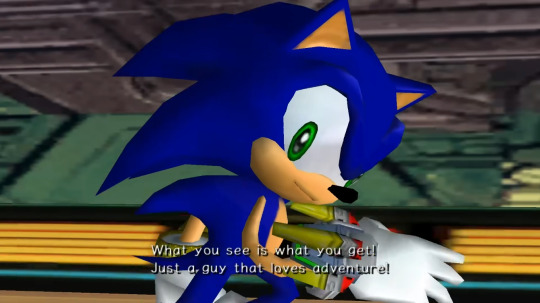
Sonic is also a character that remains static rather than having a major character arc. While he can grow when it comes to things that don't affect his overall character, such as Sonic learning and overcoming Shadow's Chaos Control technique in Sonic Adventure 2, he has no emotional conflict to overcome. He has been a fully realized character since the beginning of the franchise.
Compare this to a character like Tails, whose character arc is about him being bullied for his two tails in the past and being inspired by Sonic to be more confident in himself, as communicated in the Sonic 2 manual and his Sonic Adventure campaign. Divulging Tails' backstory is necessary for the improvement of Tails' circumstances and confidence levels to be effectively communicated in the story.
Fictional characters are narrative devices created to tell a story. They are not real. Again, there must be narrative reasons for them to be the way they are.
Providing Sonic's backstory would serve no narrative purpose—none that would serve the themes his stories and character are meant to serve, at any rate.
Sonic has no trauma - and that's a good thing
Upon analyzing Sonic's character in the games for so long, it has become astoundingly clear to me that Sonic does not have an ounce of mental trauma from everything he has been through. This should not be seen as a bad thing, but rather a well-thought-out and deliberate decision that serves to reinforce the role his character serves.
In the face of situations that would be considered stressful or traumatic to the average person, Sonic remains unfazed and even excited. There are countless examples of this: Sonic jumping from a plane with nothing but shrapnel to use as a surfboard in Sonic Adventure 2; Sonic expressing excitement that he's near an active volcano spewing lava in '06; Sonic exuberantly grinding over pits of lava in Black Knight; Sonic burning up with excitement at the prospect of dangerous stakes in Team Sonic Racing while everyone else seems to be concerned.
For Sonic, danger and near-death experiences are not a source of emotional struggle, but rather a source of fulfilment and joy. He lives life on the edge; the excitement of diving off of a plane or nearly falling into lava only fuels his love for life.
Additionally, Sonic also enjoys the simpler pleasures of life. Exploring the world. Reading books. Going on relaxing vacations. Racing through open fields. Life is one big adventure and Sonic is having a blast living it.
The idea of Sonic having some kind of secret, hidden trauma that he hides under the guise of a fake smile can be a fun fanon trope, but, for the purposes of canon and official Sonic stories, there are clear reasons why they should stay as fanon. If Sonic had trauma, it would undermine his unrelatability and make no sense given his role in his stories. Tropes such as Hurt/Comfort and Angst are ubiquitous when it comes to fandom culture, and this could be a case of those tropes appearing in the Sonic fandom simply due to the nature of fandom itself. Enjoying fanon in and of itself is all well and good, but advocating for it in canon will homogenize it by stripping away what is unique about the media we love.
In the end, there is no reason to believe that Sonic pretends or does not behave genuinely when it comes to expressing his true emotions. Sonic simply has nothing dark inside of his heart to hide. This is confirmed in Unleashed, where Sonic's heart is strong enough to resist the negative emotional forces of Dark Gaia without him even realizing. The subconscious nature of the action combined with his humility even leads him to initially think it to be Chip's doing. His heart is so strong and so pure that it is incorruptible by negative forces. This shows how Sonic's resolve is effortless and practically baked into who he is.
Sonic's internal strength is completely unconscious on Sonic's part. He doesn't actively try to be the way he is. He just is.
Sonic doesn't cry - you get the idea
It has become a hot topic in the fanbase in recent years that Sega once provided a revision note for Sonic to not express excessive emotion such as outwardly crying or sobbing.
This idea has generally been met with hostility and aversion from fans. However, this negative reaction has always confused me, and I hope to offer a different perspective to the issue.
Why does Sonic need to cry?
Let's expand on this argument for fairness' sake. A common rebuttal grants that Sonic doesn't usually cry. But in extremely emotionally difficult situations, such as loss or mourning, Sonic should cry because it is only natural to cry in such a situation.
Again, I want to challenge this notion. We could approach it from the angle of human psychology and behaviour—it is far from the case that everyone cries in response to severe adversity, belatedly or otherwise—but instead I want to explore this with respect to the narrative angle we have covered so far. Specifically, with respect to the idea that characters, unlike you or me, are designed and portrayed with certain purposes in mind.
Why would it be natural for Sonic to cry?
To help understand Sonic's handling of loss, let's analyze four examples from the series of Sonic losing someone.
In Sonic Adventure 2, Sonic stays strong and composed right after Shadow's presumed death, paying respect to his fallen ally.
In Sonic Unleashed, after Chip leaves him, Sonic takes a deep breath before moving forward with a smile on his face.
In Sonic Battle, Sonic is desperate for Emerl to live and expresses this openly.
In Sonic '06, Sonic expresses a great amount of despair when Elise dies in an explosion aboard the Egg Carrier.
It is clear from the outset that Sonic is not an uncaring individual - he wouldn't do all the selfless things he does if not because he didn't care about people. He also still feels strong emotion at losing those close to him, but he handles those emotions with a great deal of fortitude. In Adventure 2 and Unleashed, his reaction is more subdued, while in Battle and '06, it's clear that Sonic is upset and isn't afraid to show it. The difference could be due to that in the prior examples, Sonic watched them die in front of his eyes, while in the latter examples, they were already gone by the time we see Sonic's reaction.
Nevertheless, Sonic feels emotion. It is only because he does not express himself in an adequately typical way that this idea is met with so much outrage and pushback. Because Sonic does not cry, and because an expected response in certain scenarios would be to cry, it is perceived as a writing mistake that must be fixed. Sonic is perceived as a bad character because he does not fit into a rigid box of socially acceptable expressiveness.
But why is Sonic acting outside the norm necessarily a bad thing? The fact that Sonic can go through such hard situations and remain positive is a testament to his strength. The fact he doesn't cry makes him come across as superhuman when it comes to mental fortitude. That is not a mistake of his character that needs "fixing." That is the entire point.
The animosity towards the idea of Sonic not crying, that he must express himself a specific way, a distinctly normal and humanlike way, is stirred from the irrational, yet sadly common, leap in logic that Sonic must behave and experience life like you or me.
There is an irony, too, to how localised this demand of realism is of Sonic. I've seen no outrage demanding that he spill blood or break bones like us. But, apparently, he must shed tears to be a good character. Sonic is superhumanly resilient while running, or fighting, or taking on the miraculous powers of the Chaos Emeralds. Chaos is power and power is enriched by the heart. Sonic's is shown to be one of the strongest and purest out there, one that moves ever on from and through the pain of loss, grief, and tragedy. Isn't it bizarre, then, that this is considered a defect to him?
The messaging of Sonic
Sonic's core concept as an inspirational character must be maintained because it is key to the emotional messaging of nearly every single Sonic game.
Right from the very first game, you play as a plucky little hedgehog, fighting against the tyranny of Eggman's industrialization threatening to destroy all life on the planet.
Sonic is small and unassuming. But he fights anyways, determined to stop Eggman. And he does.
This concept remains throughout the franchise. Sonic always remains steadfast in the face of great adversity. From Sonic CD's "You Can Do Anything" vocal theme telling the player to believe in themselves to simple yet motivational phrases—ones that Sonic himself has given to the likes of more normal characters such as Elise: "If you have time to worry, then run!"
There is even a quote on the Japanese box art of Sonic & Knuckles comparing Sonic to the Sun, the far and unreachable star in space that our entire galaxy revolves around.

We look up at the Sun like how we look up to Sonic.
As brought up earlier, Sonic is the antithesis of relatability to his target audience, children.
This is because he is meant to inspire children.
The fact that Sonic remains so popular and successful to this day is undeniable proof that relatability is far from a necessary ingredient for likeable characters. Given the fact that Sonic is such a strong-willed character, that he fights endlessly against adversity with a smile on his face, that he always gives positive words of encouragement, is it any wonder why he is so popular with children? Sonic is a wonderful role model that promotes living life to the fullest. Sonic is deceptively wise, seeming to know simple yet effective solutions to every problem. Sonic encourages you to chase your dreams, to stay strong through hard times, to enjoy life.
Sonic is a friend who is always there for you.
Not only does Sonic provide guidance to characters, he provides guidance in the real world as we navigate our lives and the trials and tribulations that come with them. Each character that presents a problem is the character we are meant to connect with, and Sonic is who we strive to be.
CONCLUSION
I do not hold any grudge against relatable characters. I love them, just as I love all kinds of different characters in all kinds of media.
I believe that coexistence is possible. I believe that you can praise a character for their relatability and realism, just as you can praise a character for being the antithesis of both of those things, and these do not have to be contradicting principles for one to have. It all depends on a character's narrative function and how their character traits – both relatable and unrelatable – serve the story that is being told.
Sonic the Hedgehog is a character whose role in the narrative is to inspire and guide other characters. From a Doylist perspective, he represents the prominent, all-embracing messaging about staying strong and positive despite all odds, inspiring and guiding his target audience.
Every decision put into Sonic's character traits serve his role perfectly. Of course this extraordinary character does not behave like you or I do. Why would he? That's simply not his nature; a gust of wind in the breeze, moving endlessly all throughout the world. A pure and positive heart who has achieved the innate desire of all humankind in a way that we will never truly understand, free from the burdens of human nature. Freedom.
Sonic is unrelatable and unrealistic. And he is an amazing character.
#sonic the hedgehog#sonic#essay#sonic characterization#sonic fandom#long post#sonic analysis#my first time writing and posting an essay online about sonic!#i've come to realize that people may actually be interested in what i have to say#and i am very passionate about sonic so this was a great exercise for me
420 notes
·
View notes